Gallery #32 - Trailblazers: Polish-American Pols
NOTE: A "pop-up" version of this exhibit can be seen at Polish National Alliance (6100 N. Cicero, Chicago) as part of the Chicago Area Political Items Collectors expo on Sunday, March 10, 10 AM - 3 PM.
Gallery Guide
- 1830s, 1930s, 1959
- Giants of Congress
- Pols on Parade: Adamowski, Holewinski
- Chicago Hosts Prominent Poles
- Pols on Parade: Majewski, Pucinski, Laskowski
- Trailblazers’ Timetable
- Pols on Parade: Staniec, Lipinskis
- Play Ball!
- Pols on Parade
- Where Ya From?
- Pols on Parade: Gabinski, Brzeczak, Kasper
- Hands in the Kolaczki Jar
- One Family’s Journey
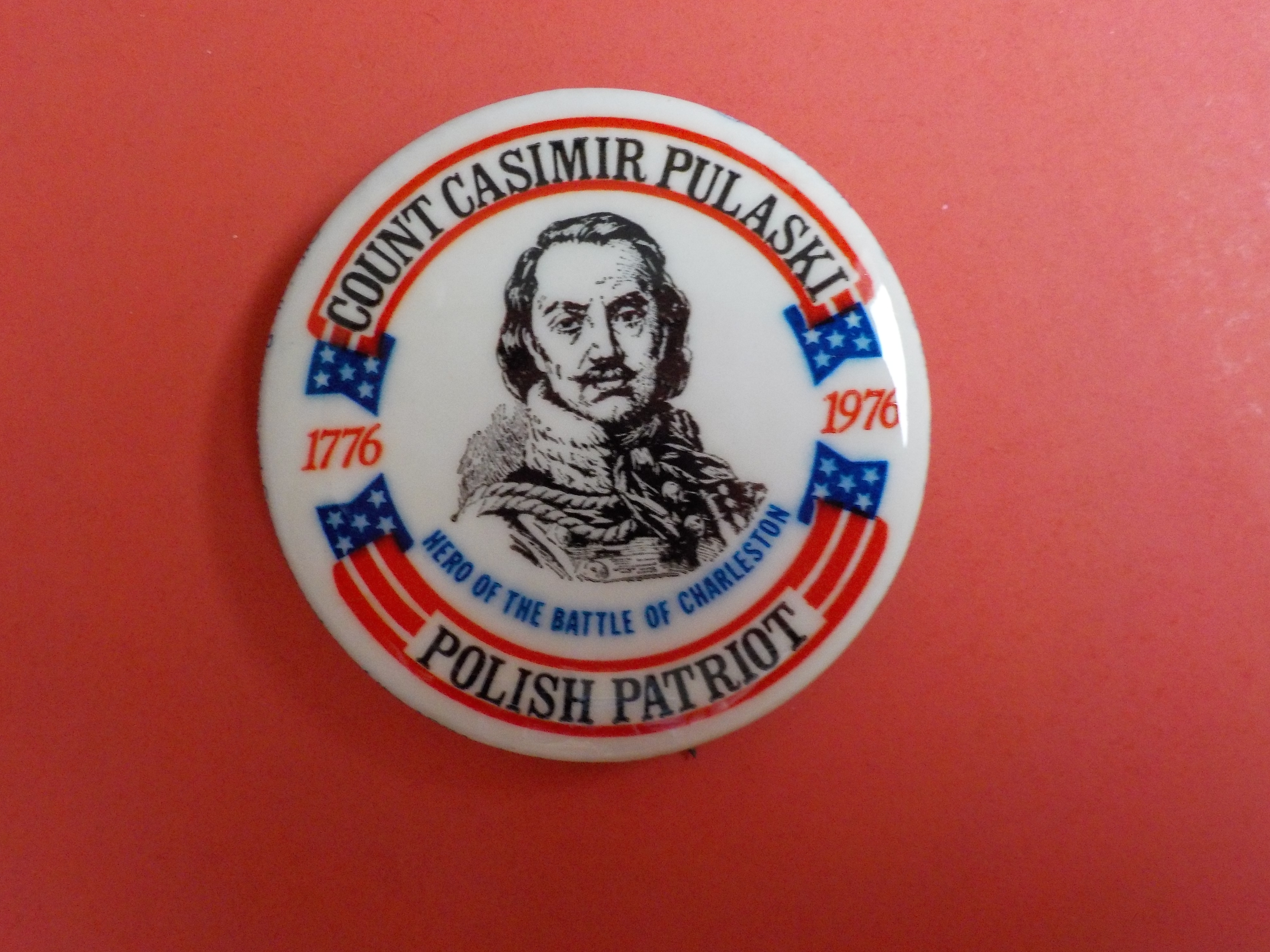 Happy Pulaski Week! This button celebrates the "Father of American cavalry" who died heroically during the Siege of Savannah.
Happy Pulaski Week! This button celebrates the "Father of American cavalry" who died heroically during the Siege of Savannah.
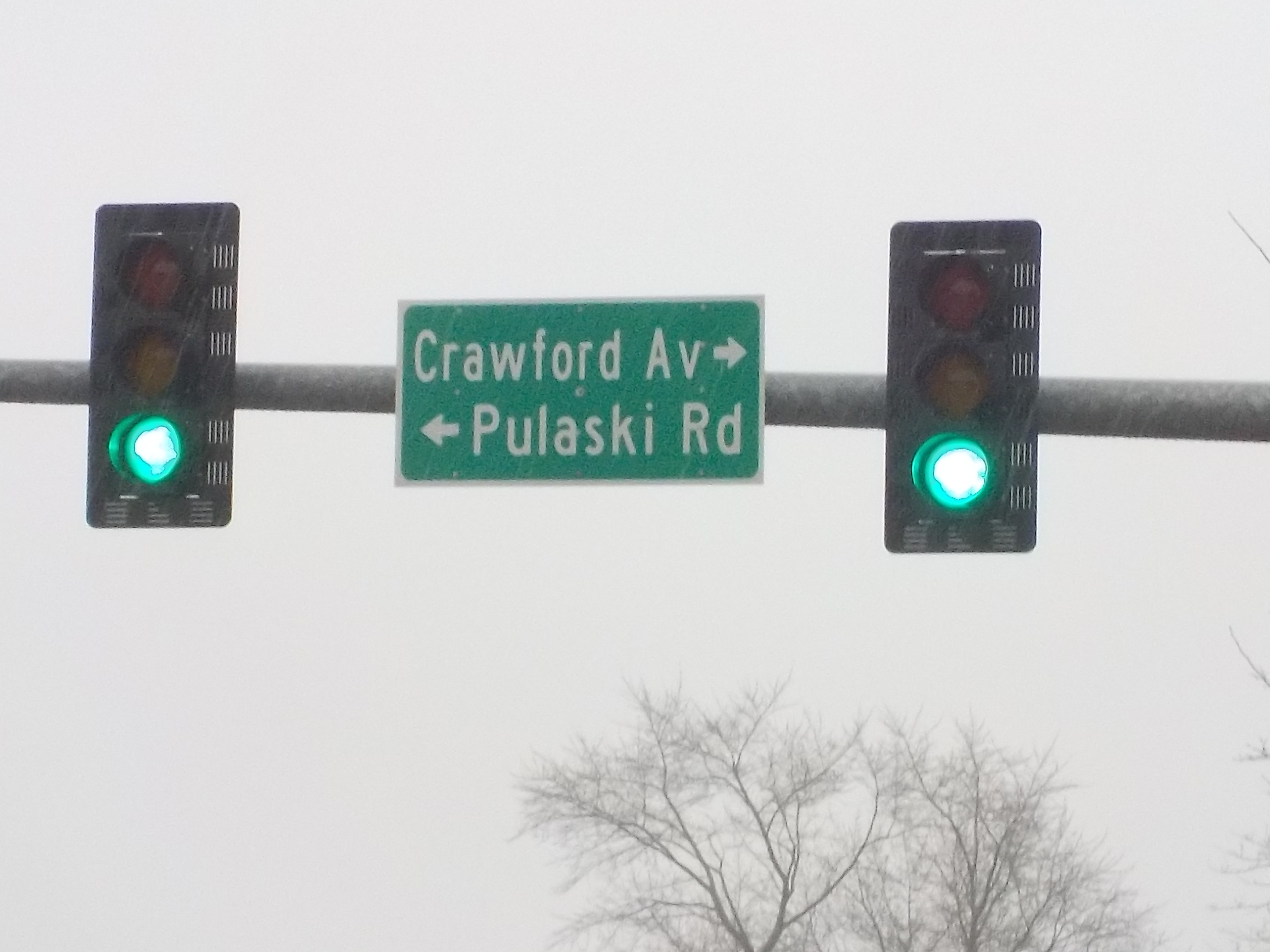
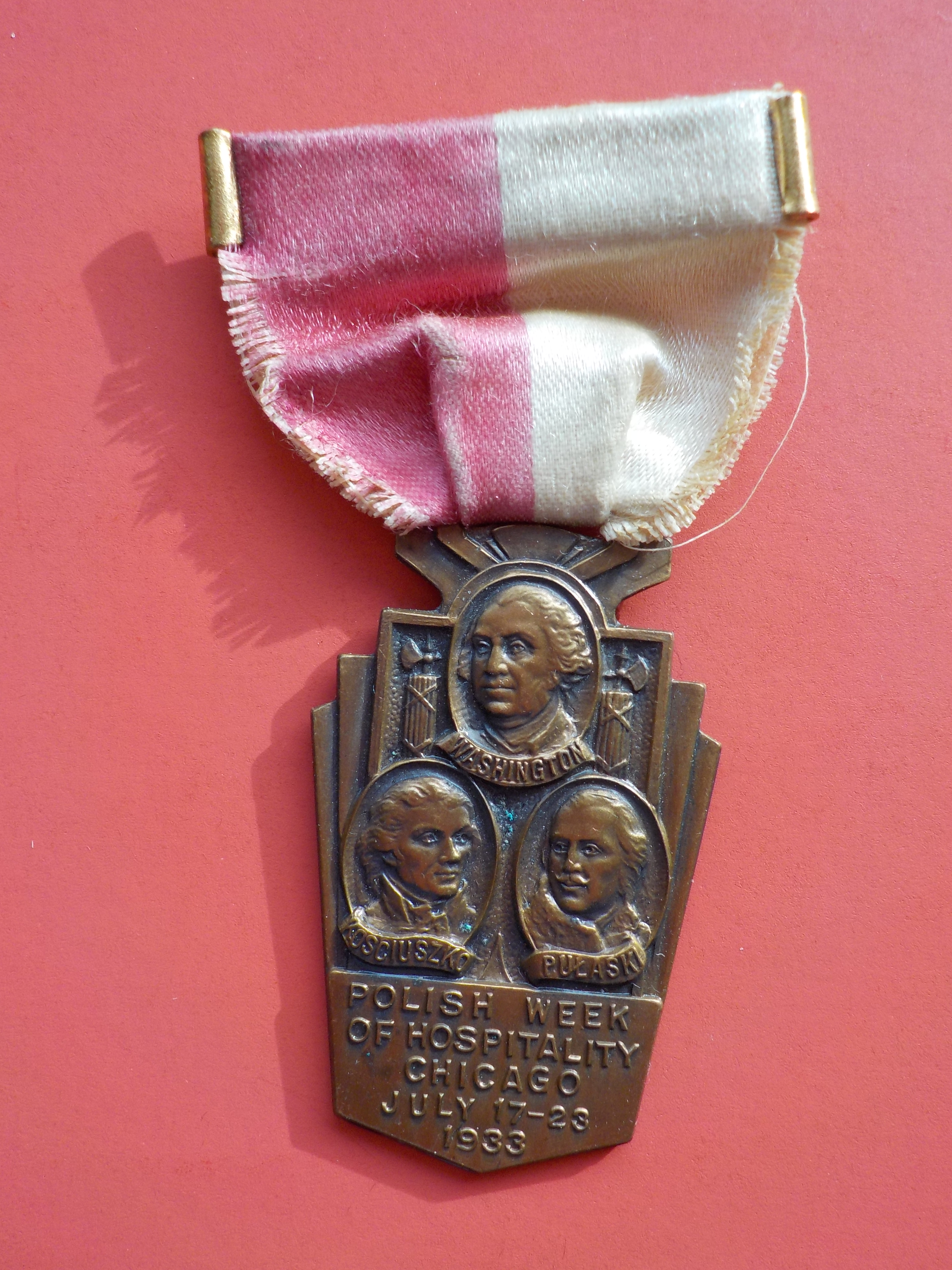
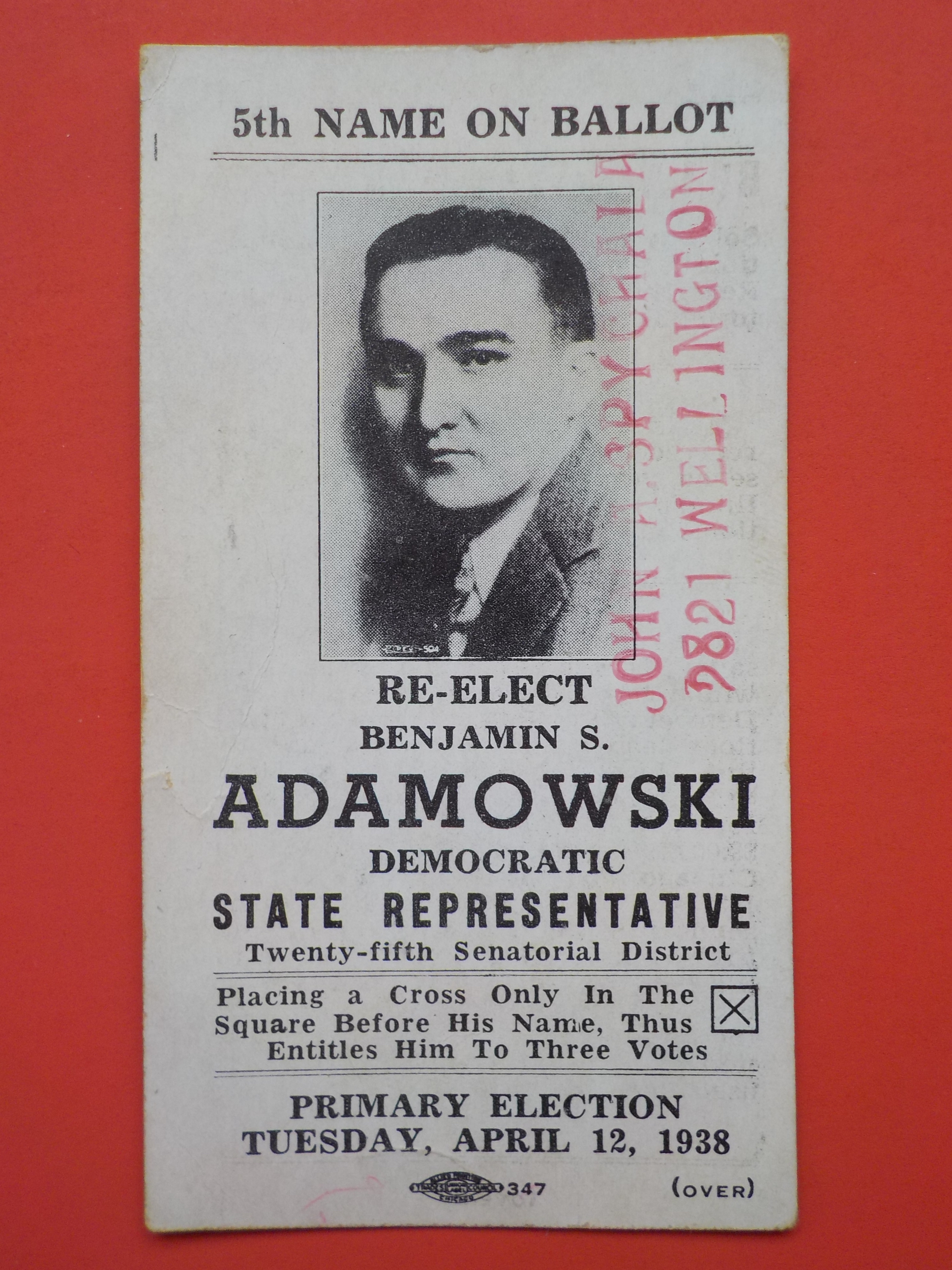
1st Poles at the Polls! On May 2, 1837, two Poles supposedly voted in Chicago’s first Mayoral election (Ogden swept the Polish vote - both of them - trouncing Kinzie 489-217.)
A century later, Chicago Polonia was having a good decade. Chicagoans enjoyed “Polish Week of Hospitality” at the 1933 “Century of Progress”. They sent 3 Poles to Congress and Ben Adamowski to Springfield. By 1935, Polonia could pile in a Plymouth and motor for miles on newly-named “Pulaski Road”.
"Polish Week of Hospitality" (1933); Ben Adamowski palm card (1938)
Polish-Americans have impacted the Illinois political scene from the start. Waves of immigrants brought along strong political passions and a tough work ethic. Chicago’s Polish-language press has always been robust. Churches and civic groups thrived. Yet two things mystify:
1. Despite electing giants to Congress and other posts, no Polish-American has been elected U.S. Senator, Illinois Governor or Chicago Mayor. (Ben Adamowski and Roman Pucinski came close.)
2. Most Illinois Polish-American pols have been male. Which makes the 50th Anniversary of trailblazer Lillian Piotrowski becoming first female Dem Committeeman in Cook County history even more important (1969).
Giants of Congress
Illinois voters have sent giants to Washington. A high point? 1959, when Illinoisans elected FOUR Illinois Polish-Americans to Congress: John Kluczynski, Ed Derwinski, Dan Rostenkowski, Roman Pucinski.
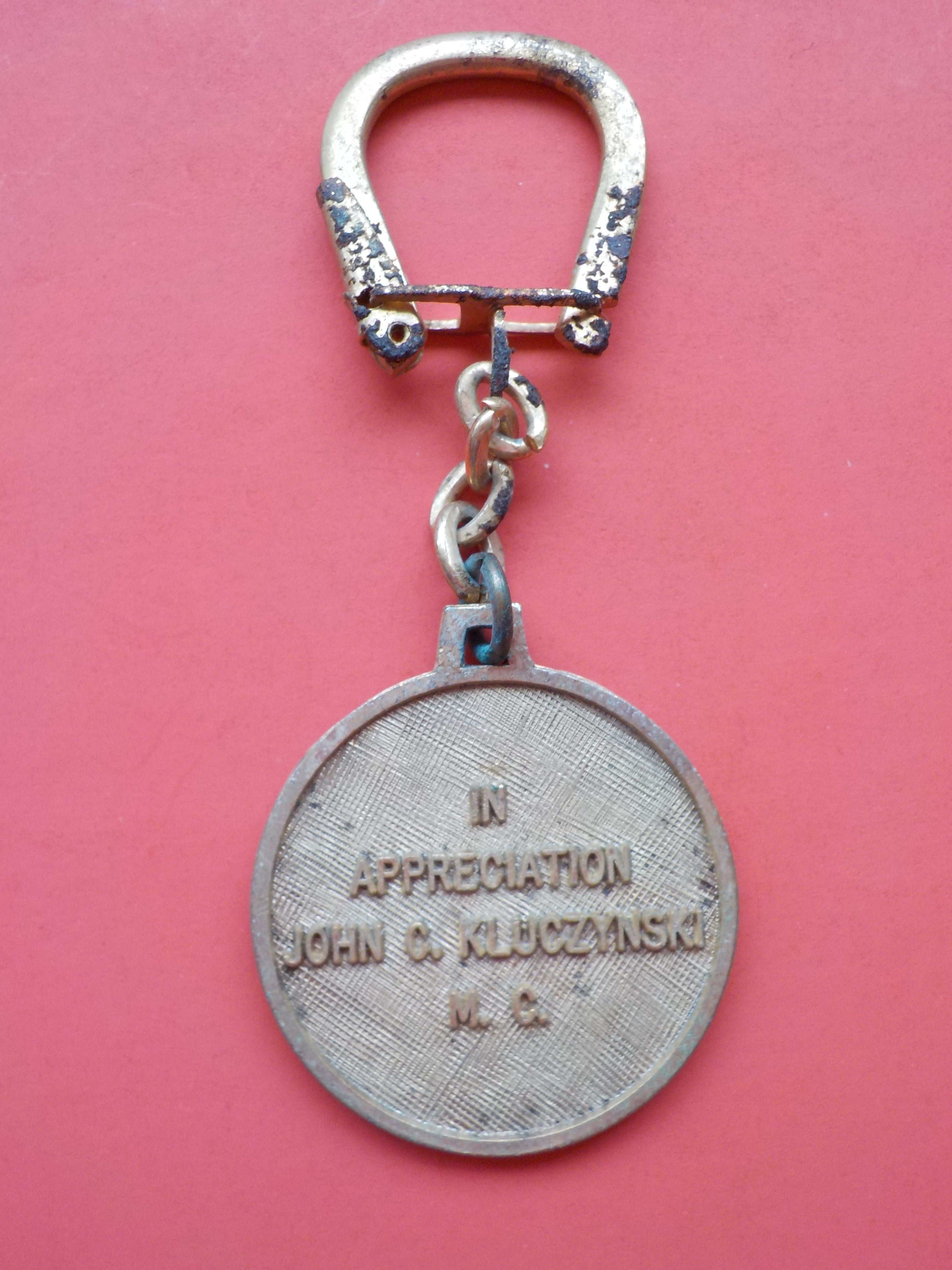
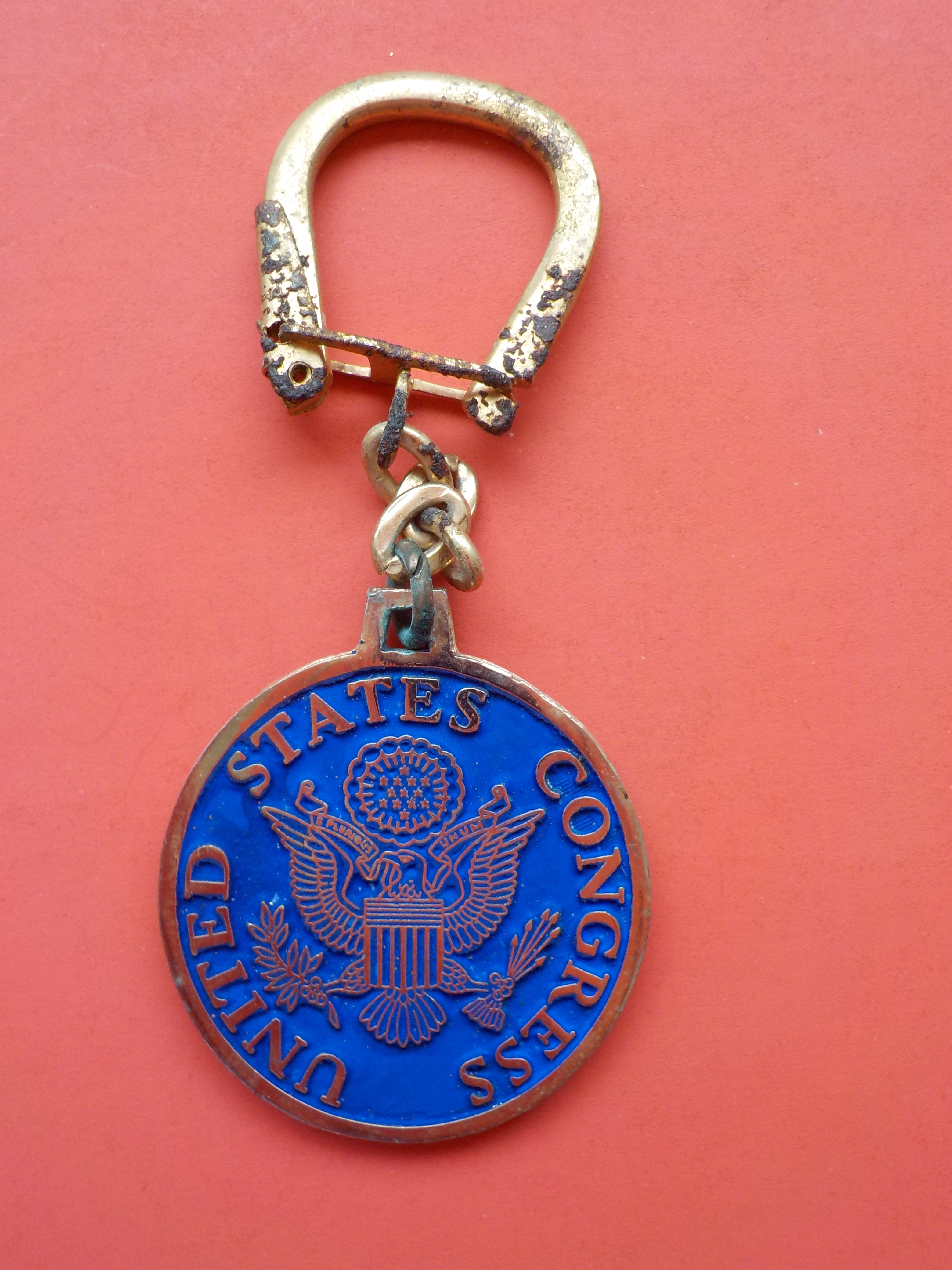
After serving in WW I and the Illinois House, John Kluczynski went to Congress (1951-75) and helped build the Interstate Highway system. The Federal Building in Chicago’s Loop is named for him. Designed by Mies van der Rohe and graced with Calder’s “Flamingo”, “The Klu” is home to two Illinois Senators, DEA, IRS, Labor Dept. His brother - Thomas Kluczynski - was a veteran jurist who spent 12 years on the Illinois Supreme Court.
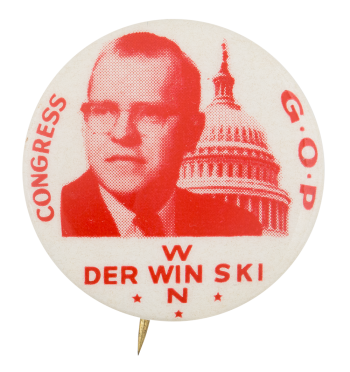
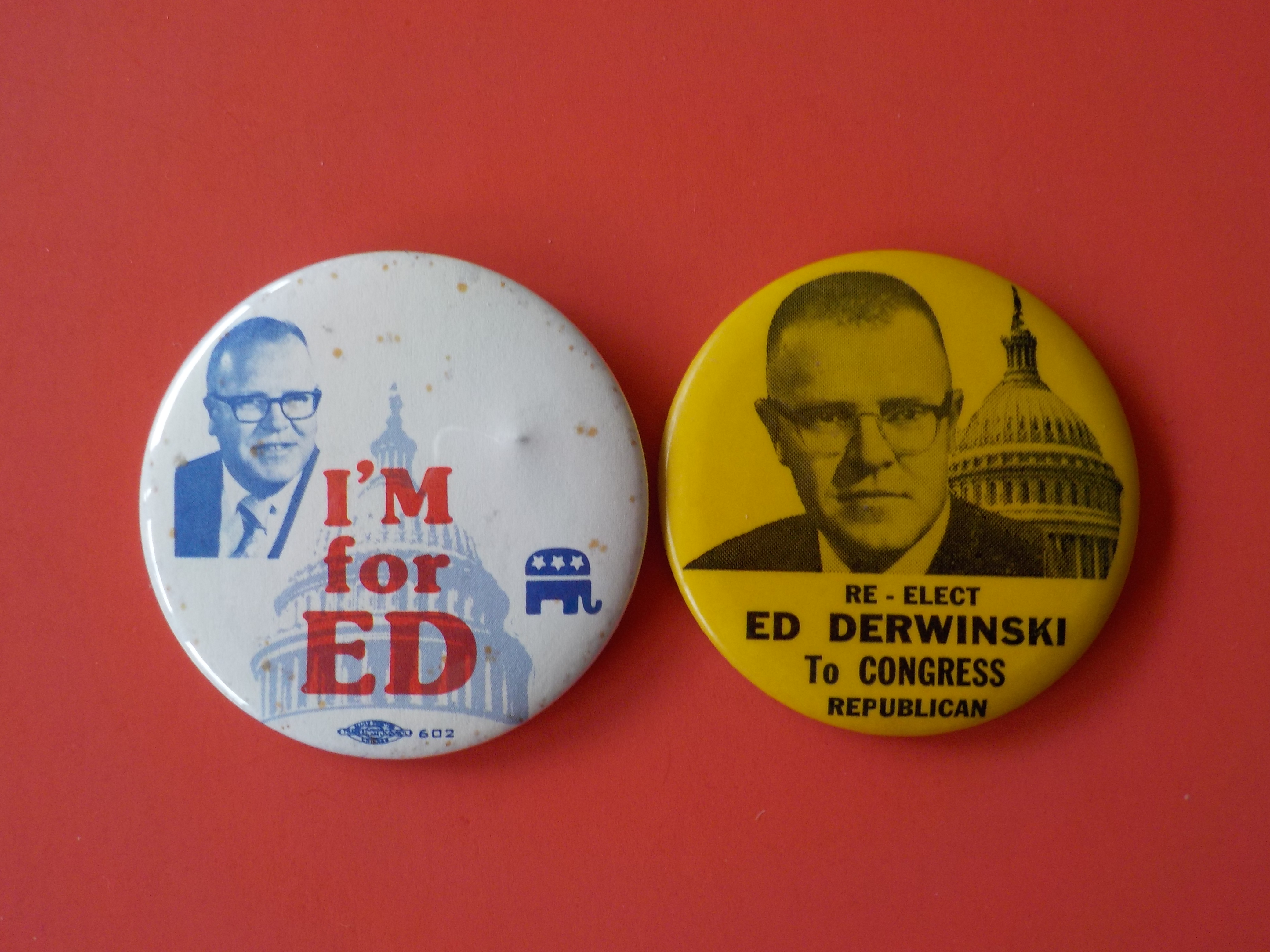
("WIN Derwinski" courtesy Busy Beaver Museum)
Republican Ed Derwinski represented the Southwest Suburbs in Congress from 1959-83 where he was a strong voice for veterans and a free Eastern Europe. A WW II vet who was in occupied Japan, Derwinski also served as U.N. Delegate and Pres. George H.W. Bush’s VA Director. "The Best Crewcut in Congress”.
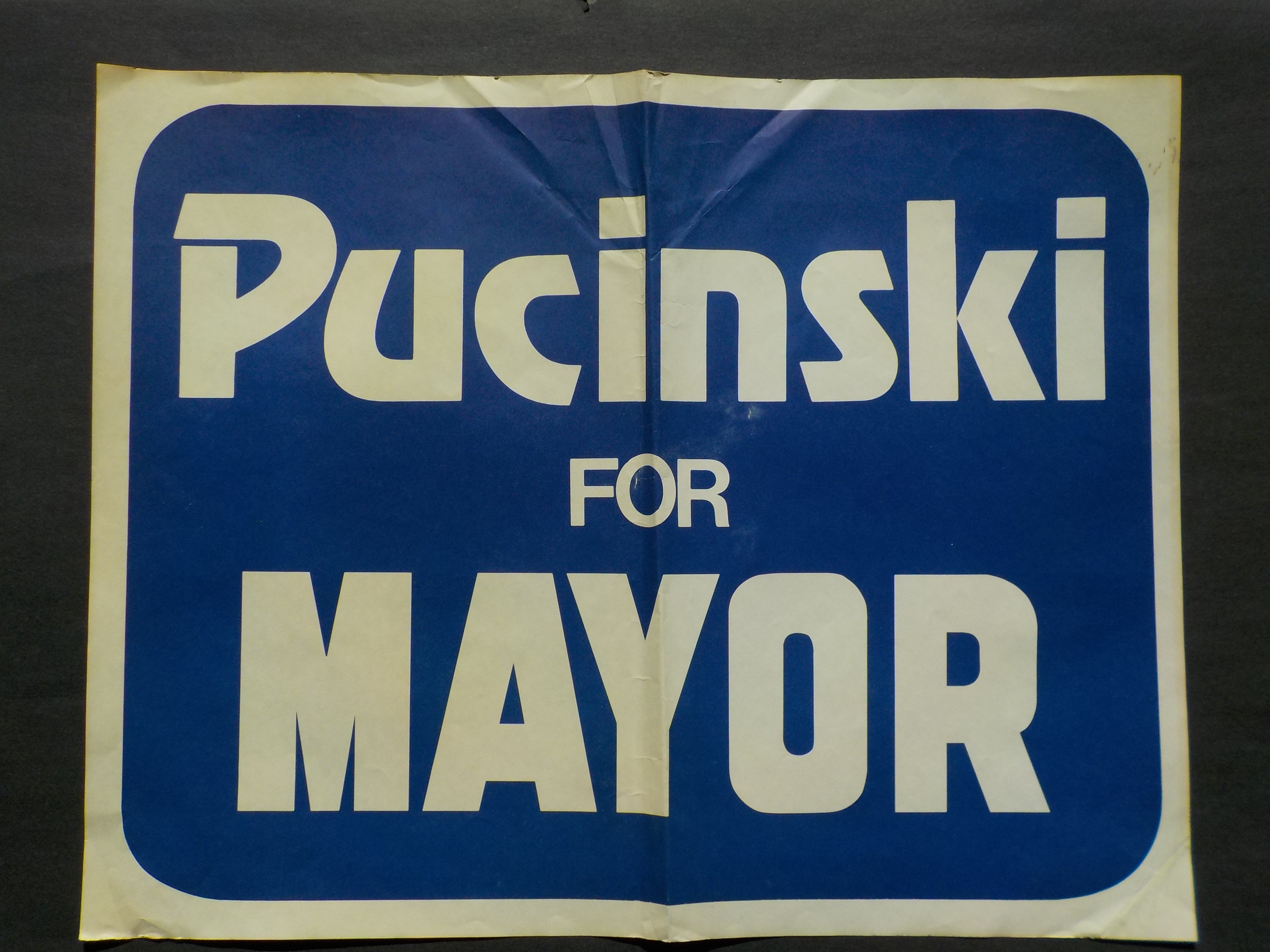
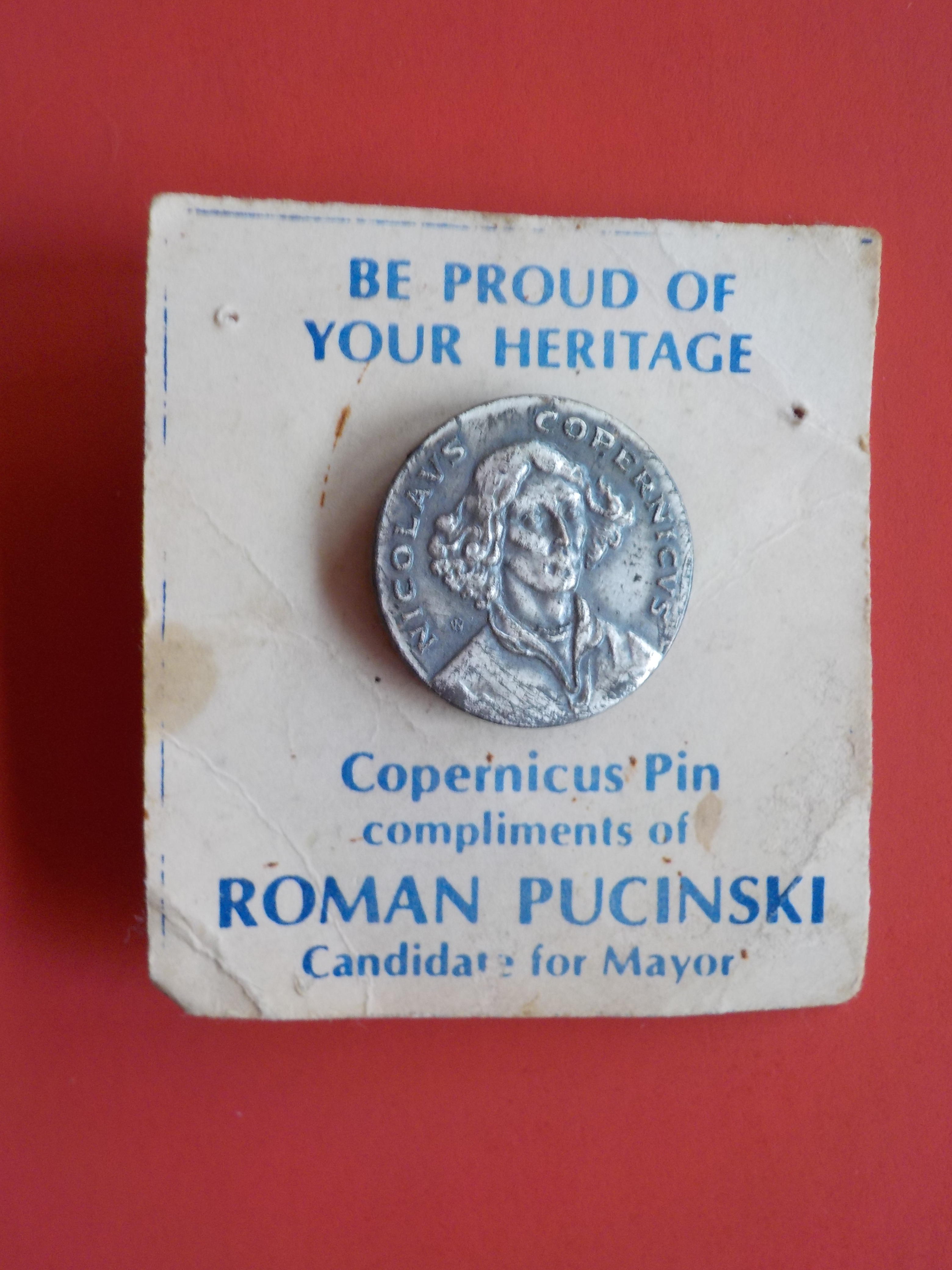
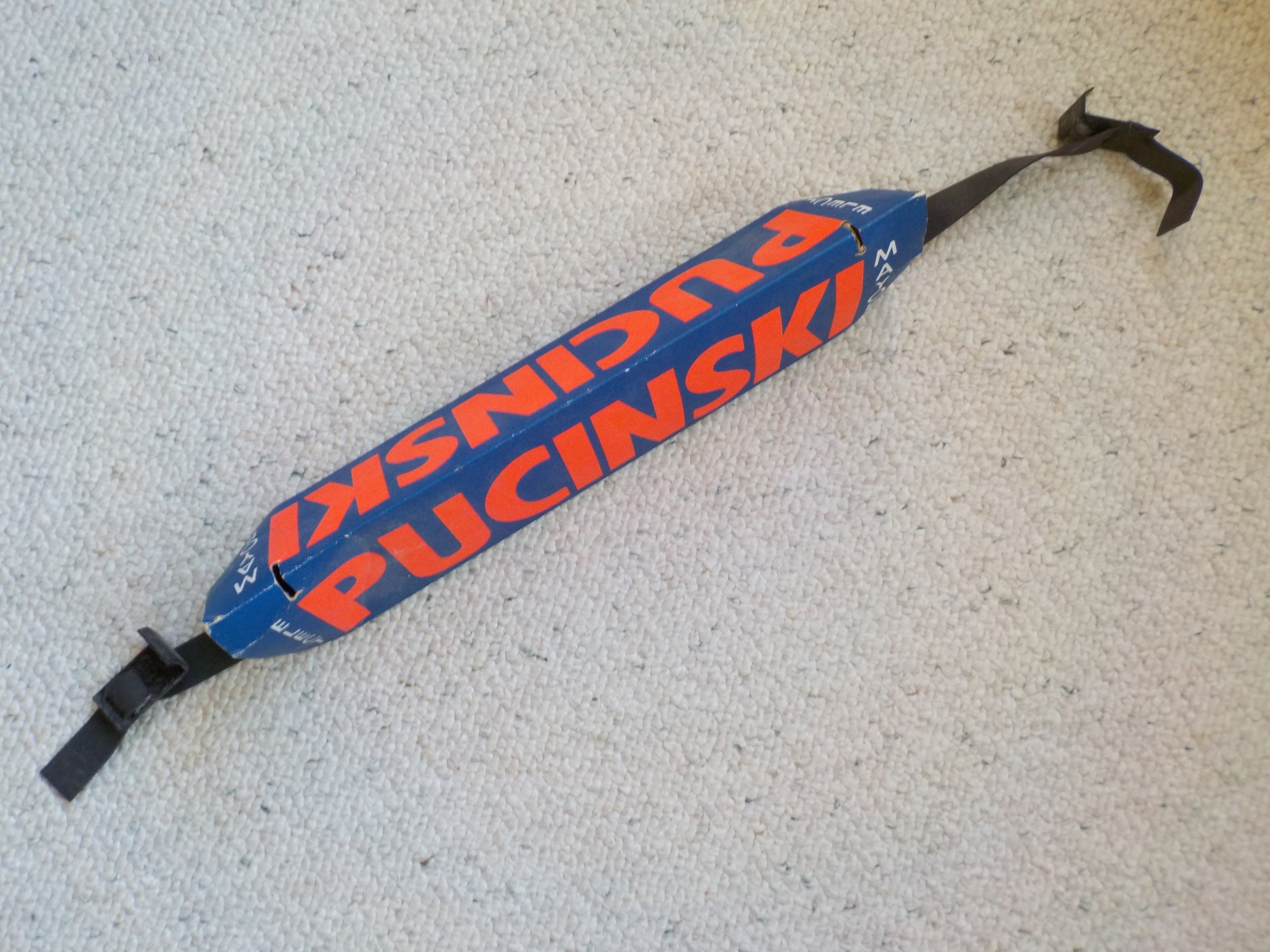
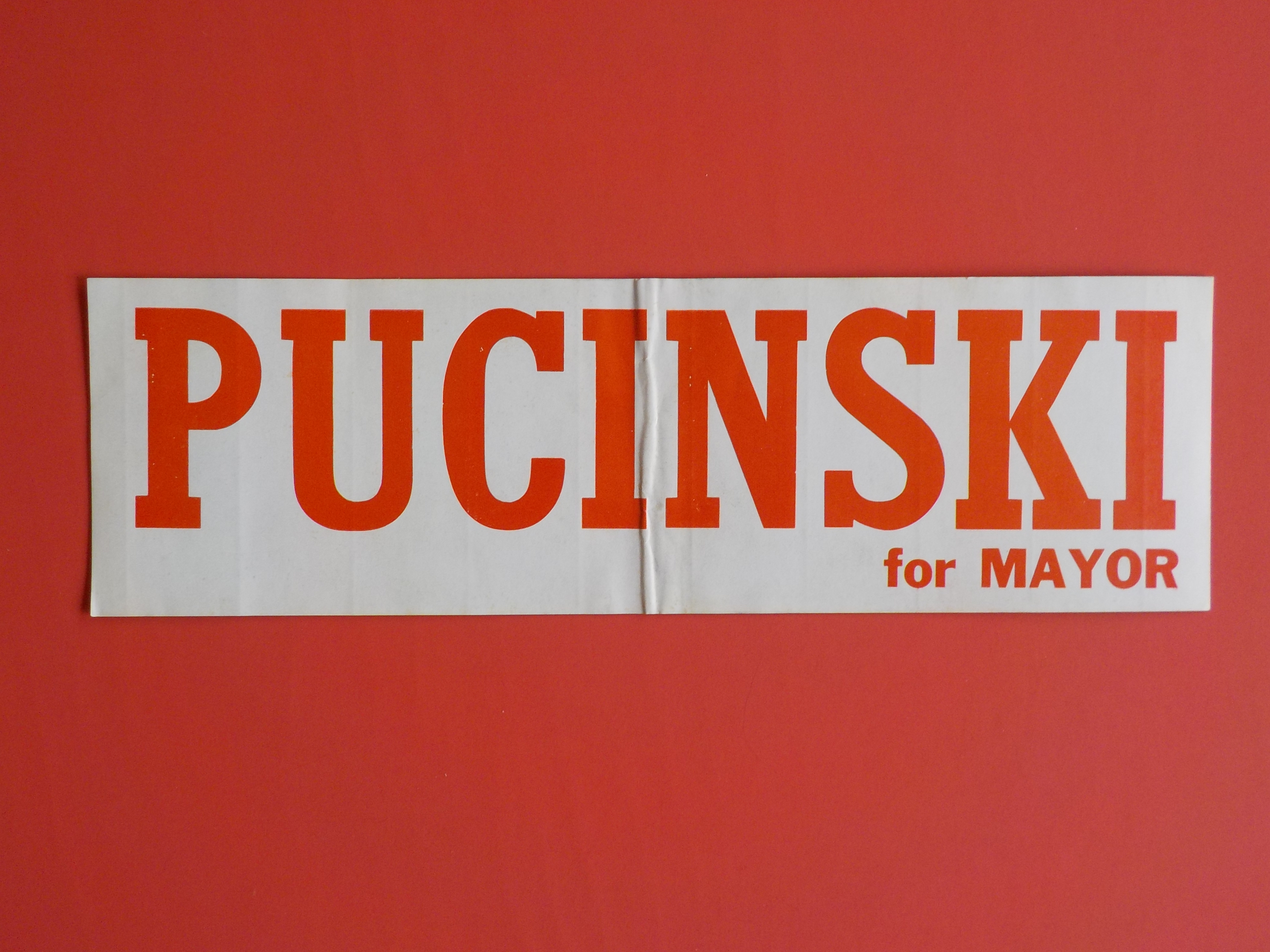
From Pucinski's 1977 Mayoral. Countless Copernicus pins were distributed to NW Side Polish households by Harold Washington volunteers (including this author) to drain Bilandic's vote. Car-roof signs were once in style...a bungee strap attached to the car windows.
Air Force vet, investigator of Stalin’s bloody 1940 Katyn Massacre, one-time newspaperman. Roman Pucinski - son of popular radio host Lydia Pucinska - had a reverse political career arc: Congress first (1959-73), then Chicago City Council (1973-91). In D.C., he promoted free speech in Eastern Europe, airplane “black boxes” and community colleges. “Pooch” won the ‘72 Dem Primary for U.S. Senate, but lost to Percy. As Alderman, he had a smaller, conservative constituency; he veered right, joining the Vrdolyak 29 bloc. This riled the Harold Washington forces and likely doomed daughter Aurelia Pucinski in her SOS Primary bid in '86 (see below).
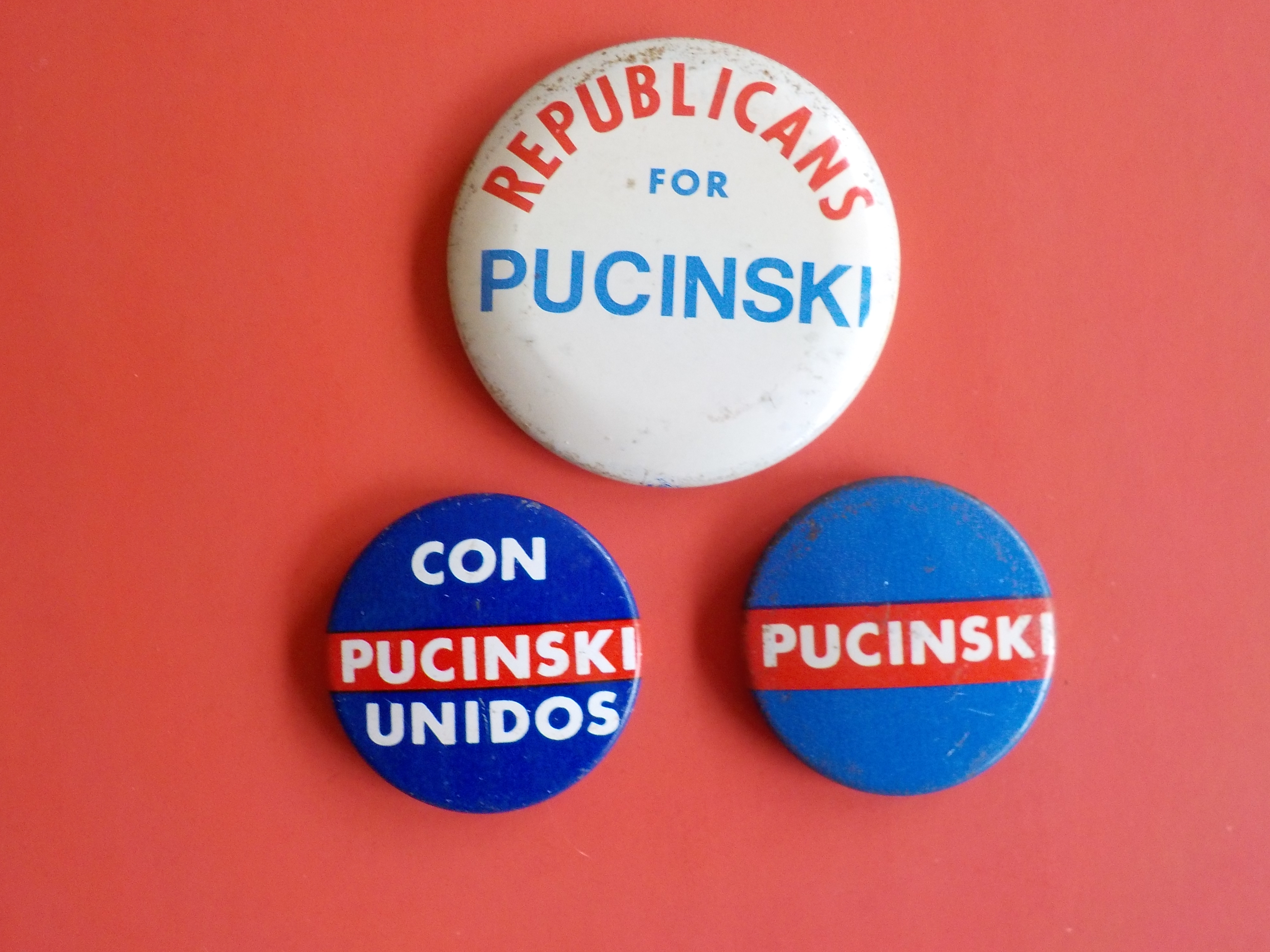
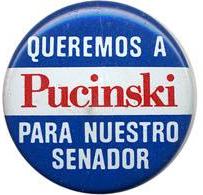
Just as Ben Adamowski had been on a collision course with Joe Rostenkowski, Pooch was on a winner-take-all track with Dan Rostenkowski. Who’d be Chicago’s first Polish Mayor? And just as Polish-American Poo-bahs proved blood is NOT thicker than the Machine by backing Daley over Adamowski, the same Bosses (and their sons) blocked Pucinski’s '77 Mayoral bid, instead backing the slated Bilandic. To paraphrase NASA astronauts, Polonia Pooh-bahs “Screwed the Pooch”!
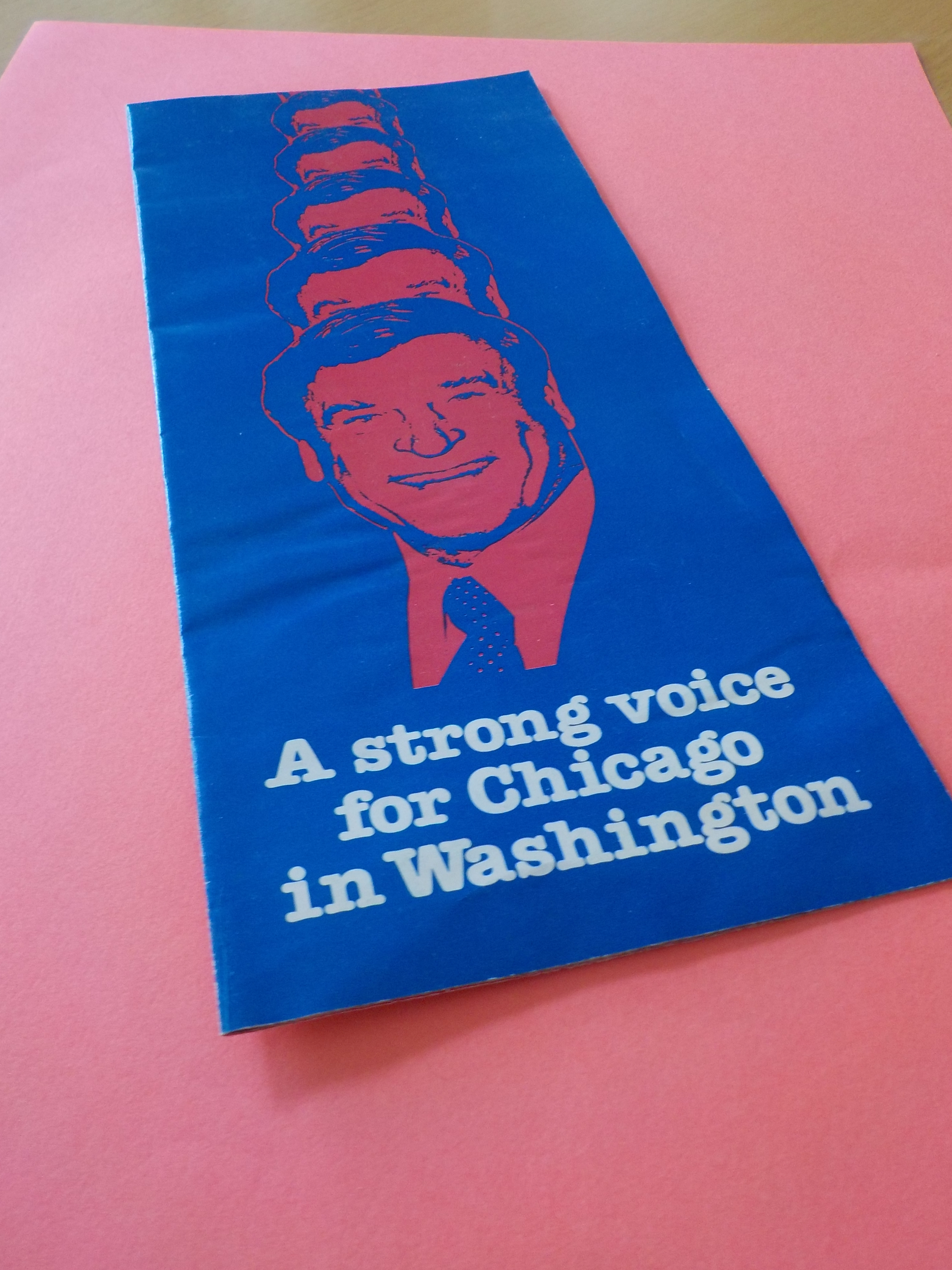 1978 Rosty flyer, apparently appealing to the hipsters, punks and rostyfarians moving into Wicker Park.
1978 Rosty flyer, apparently appealing to the hipsters, punks and rostyfarians moving into Wicker Park.
Son of Polonia powerhouse “Big Joe Rusty”, Dan Rostenkowski was elected to the Illinois House in 1952 at age 24. In ‘59, he was part of the record four Polish-Americans Illinois sent to Congress. Rosty was known for bringing home the bacon, especially as Chair of the powerful Ways & Means Committee (CTA Blue Line, Kennedy Expressway, Deep Tunnel). He pleaded guilty in ‘96 to various charges (see below). Other Illinois Poles have served in the U.S. House, such as Stanley Kunz, Leo Kocialkowski and two Lipinskis (see below).

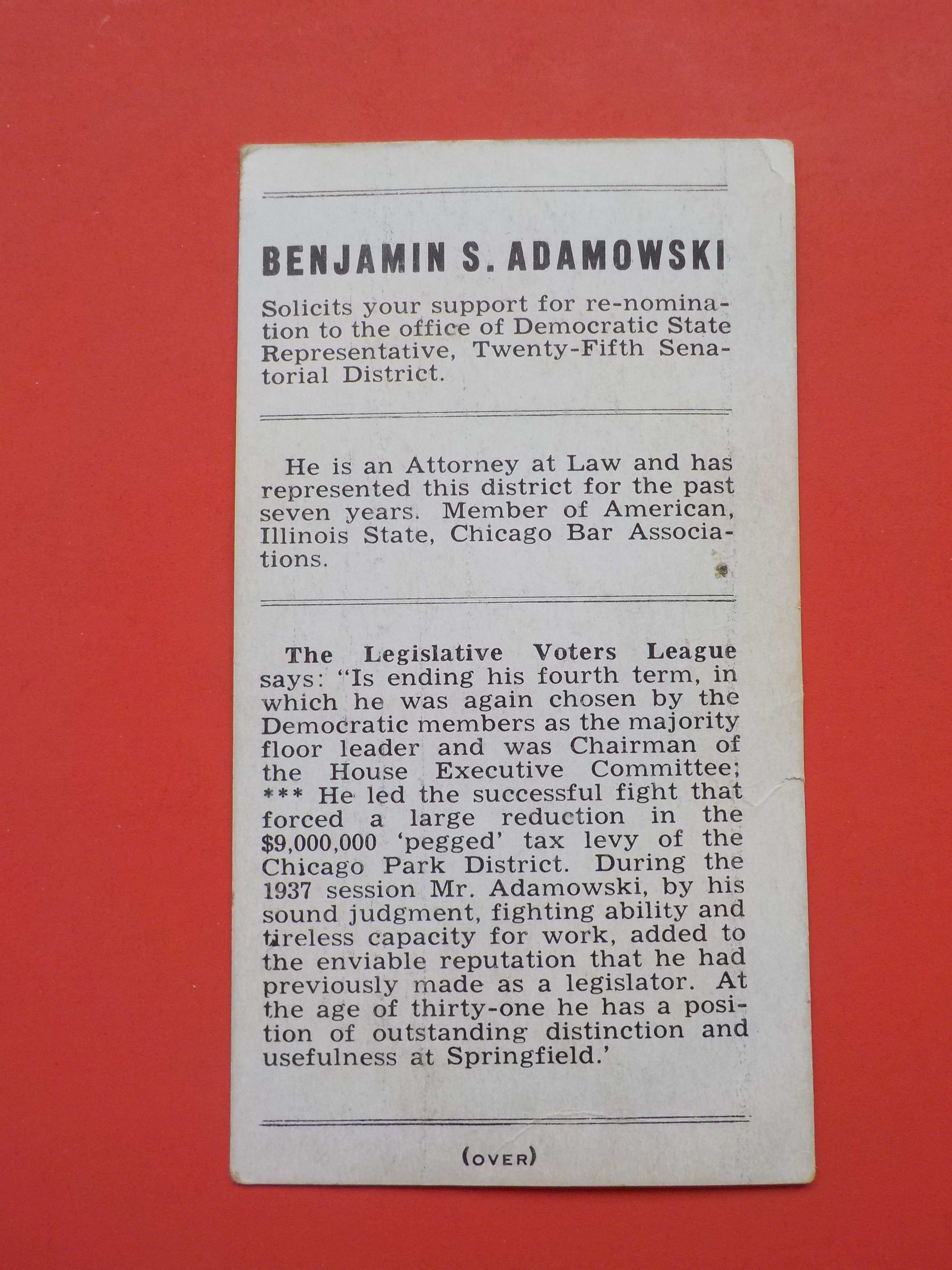
This 1938 palm card asks voters to cast all three of their votes for Adamowski, an example of Illinois’s now-defunct “bullet voting” system.
Curiously, this campaign lit was sent to 2821 W. Wellington. That building still stands (140 years old!) but most of the neighborhood was razed for the Kennedy Expressway.
Pols on Parade: Ben Adamowski Son of Max Adamowski, a Logan Square Alderman-barkeep, Ben Adamowski is a towering figure in Illinois Polish-American political history (and Lincoln historian). Elected to the Illinois House in 1930, he rose to House Majority Floor Leader, likely the first Polish-American to do so. He lost a U.S. Senate Primary in 1940, then lost the Dem Mayoral Primary in 1955 to Daley the Elder and split with his Party. But riding the 1956 Ike Wave, he won the Cook County State’s Attorney’s race as a Republican, ousting the slated Dem incumbent. Daley turned the tables in ‘60: the JFK Wave swamped Adamowski (amid allegations of “River Ward” voter fraud.)
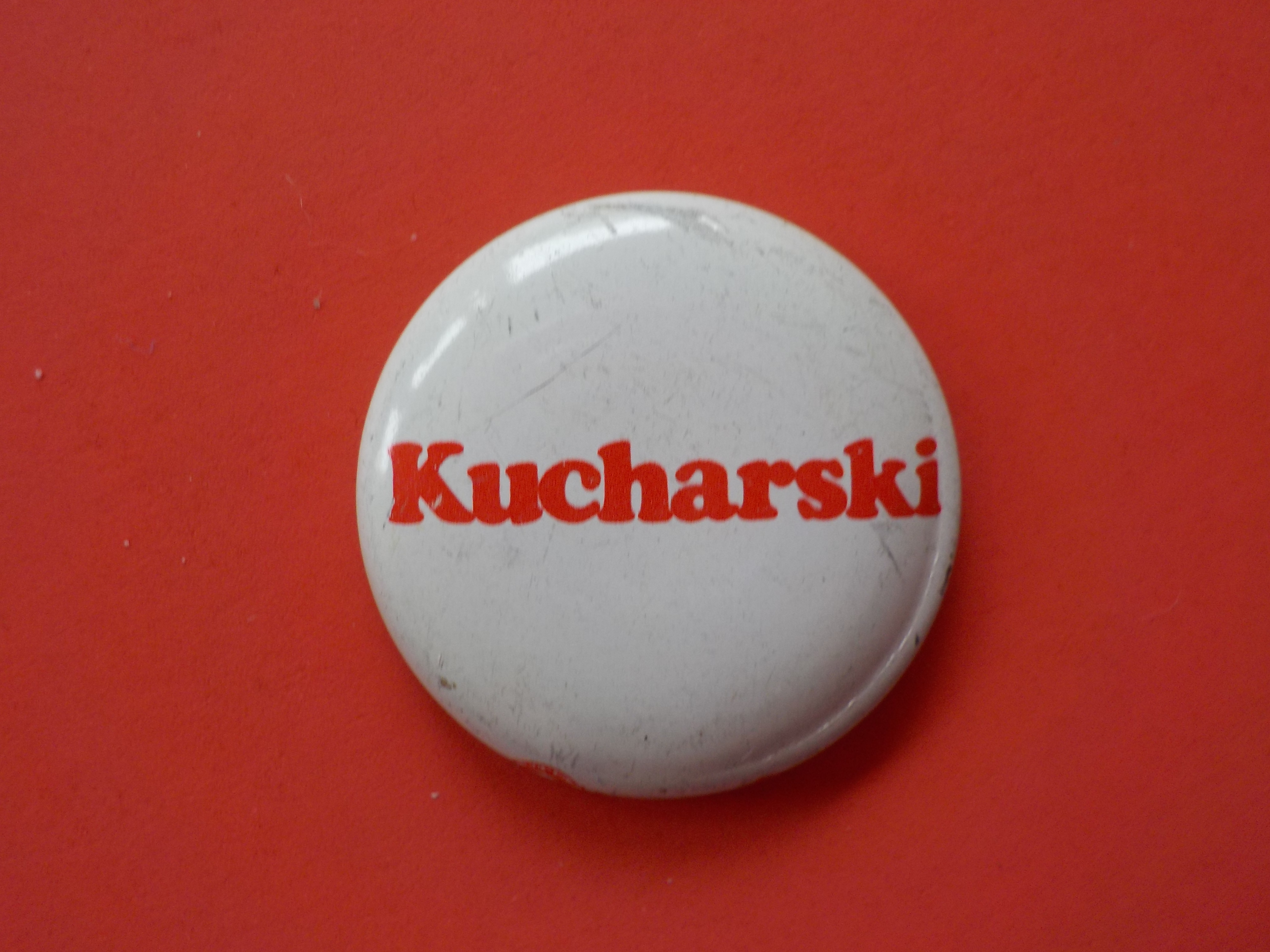 In 1956, Adamowski (who had flipped from D to R) and Edmund Kucharski ran for Cook County State's Attorney and Recorder of Deeds. Kucharski lost that race, but was later elected Cook County Treasurer and GOP County Chair. Once Chicago’s youngest Alderman, Kucharski - who played baseball at U of I - died of Lou Gehrig disease in ’94.
In 1956, Adamowski (who had flipped from D to R) and Edmund Kucharski ran for Cook County State's Attorney and Recorder of Deeds. Kucharski lost that race, but was later elected Cook County Treasurer and GOP County Chair. Once Chicago’s youngest Alderman, Kucharski - who played baseball at U of I - died of Lou Gehrig disease in ’94.
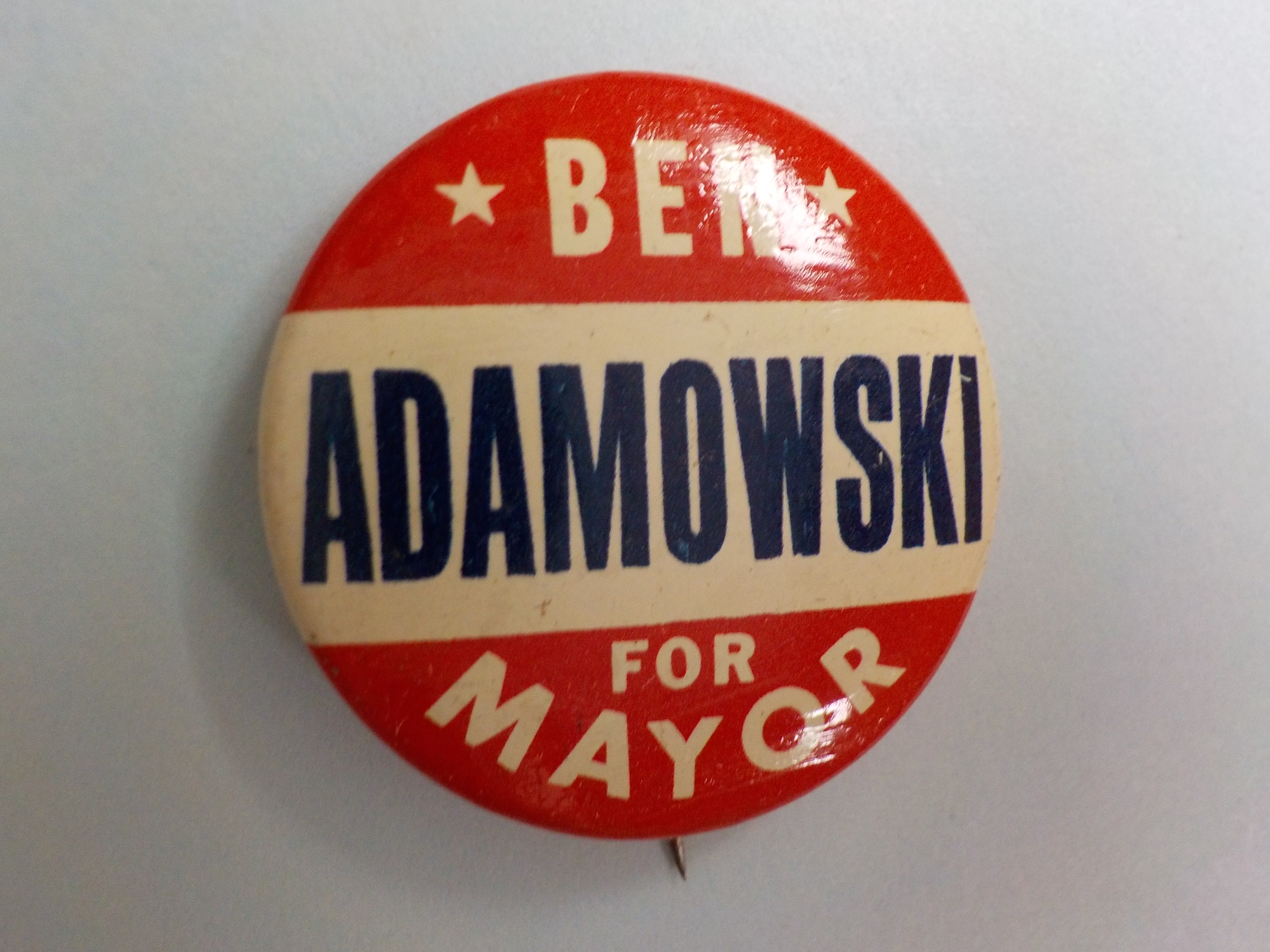
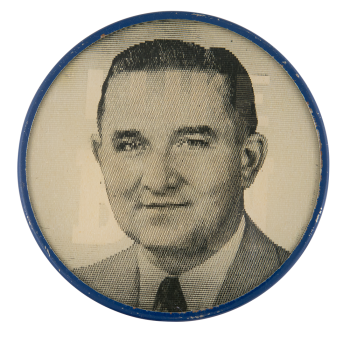
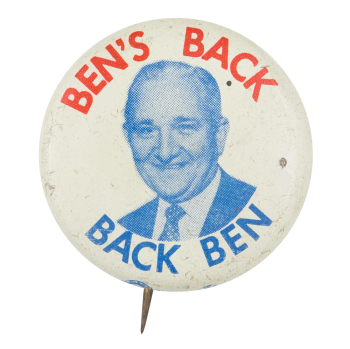 The ‘63 Daley-Adamowski Rematch was brutal. The Machine was chugging on all cylinders. Adamowski got 540,705 votes (44%), the 2nd-closest of Daley’s 6 races. (Another Pole - 23rd Ward GOP Comm. John Waner, born Jan Wojanarski - challenged Daley in ‘67, losing 73%-25%. Waner went on to be Nixon’s Regional HUD Director.)
The ‘63 Daley-Adamowski Rematch was brutal. The Machine was chugging on all cylinders. Adamowski got 540,705 votes (44%), the 2nd-closest of Daley’s 6 races. (Another Pole - 23rd Ward GOP Comm. John Waner, born Jan Wojanarski - challenged Daley in ‘67, losing 73%-25%. Waner went on to be Nixon’s Regional HUD Director.)
Adamowski tried comebacks in ’64 (for State’s Attorney) and ’70 (for Assessor). ("Ben's Back" courtesy of Busy Beaver Museum)
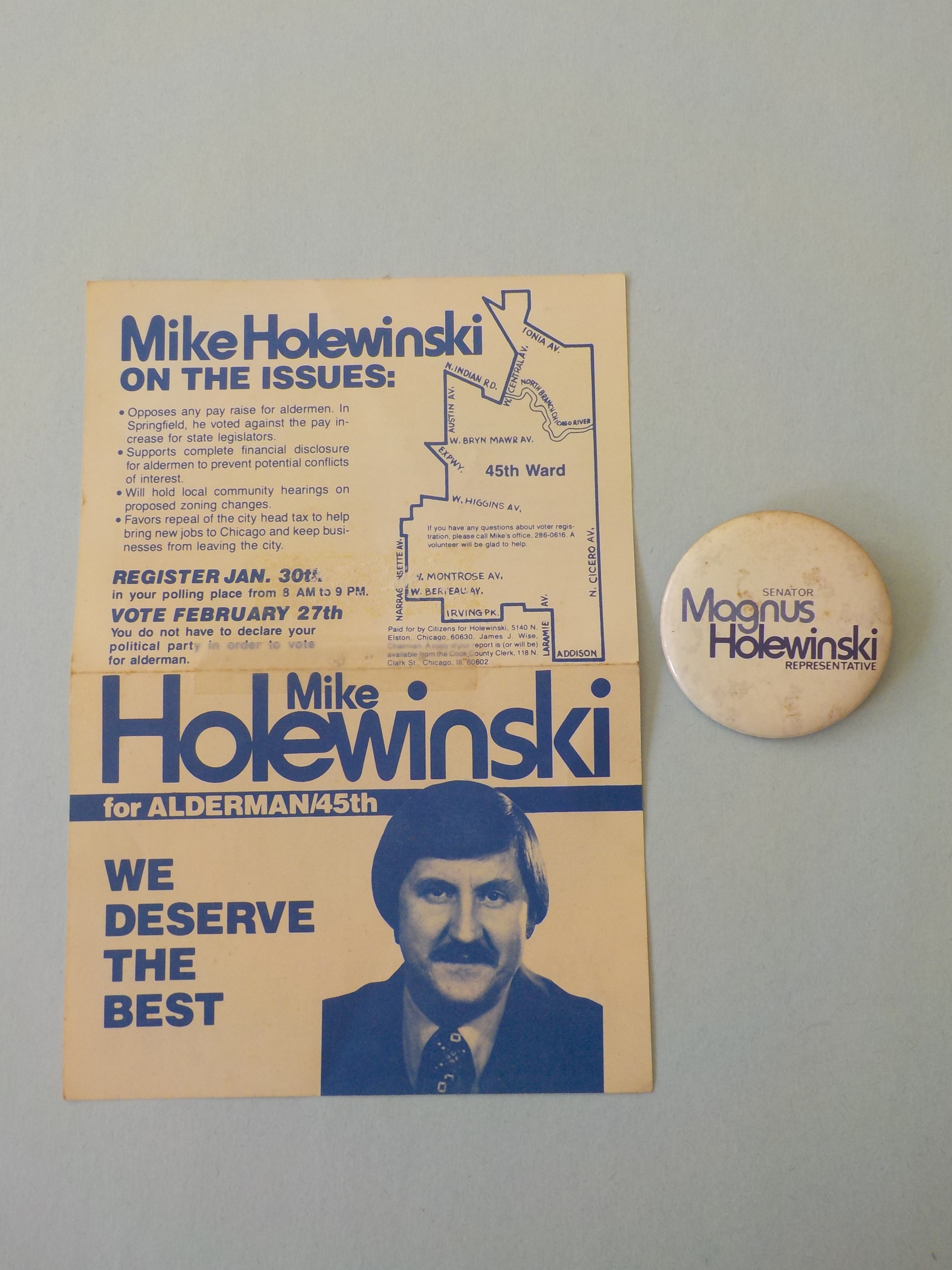
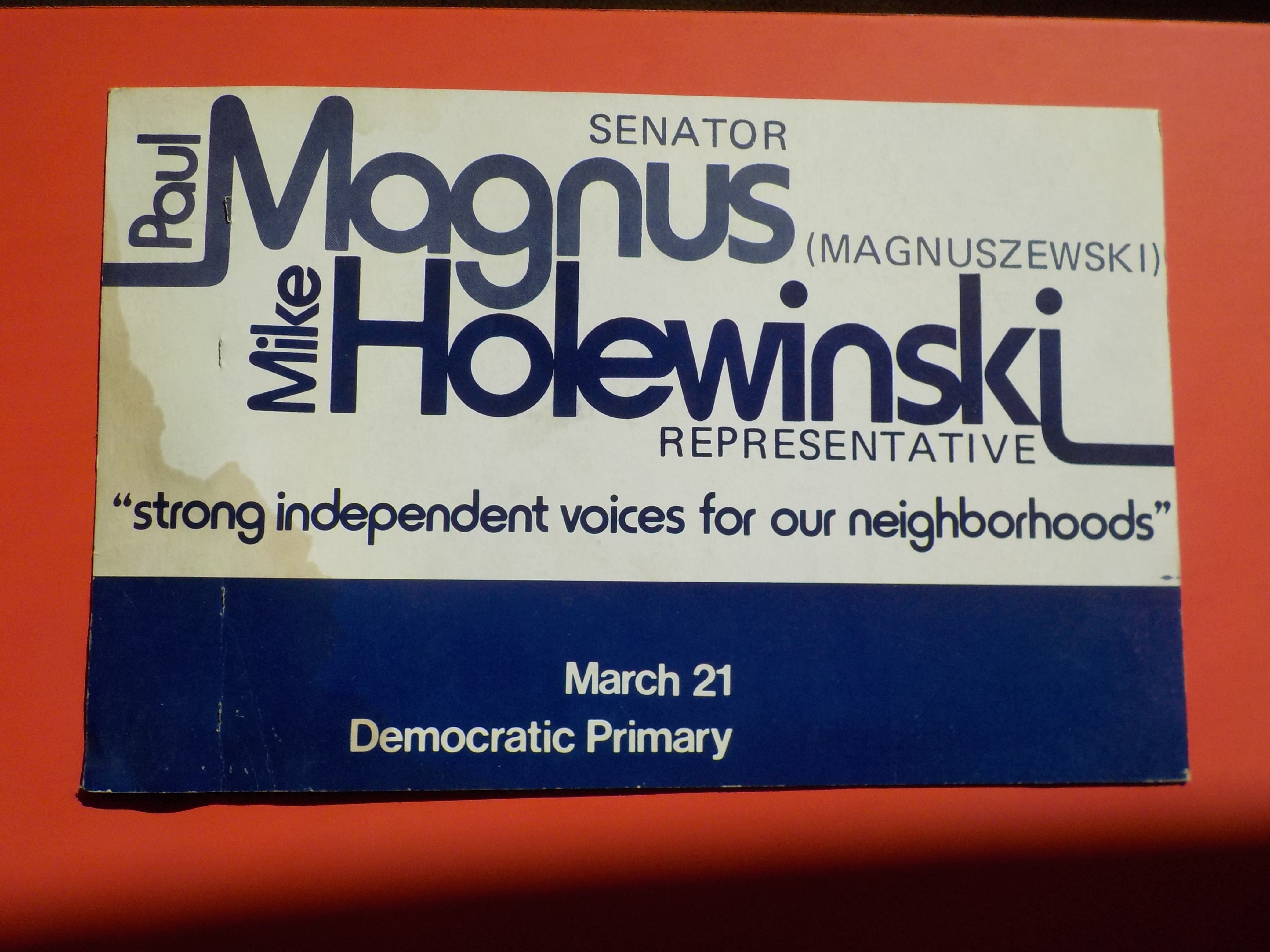
Pols on Parade: Mike Holewinski Bungalow Belt Progressive. As State Rep, Mike Holewinski led the charge for countless reforms, putting a big target on his back. He lost his seat, tried for Alderman, then turned his energies to small manufacturing. He served in Harold Washington’s City Hall and on Gov. Pat Quinn’s Gaming Board. 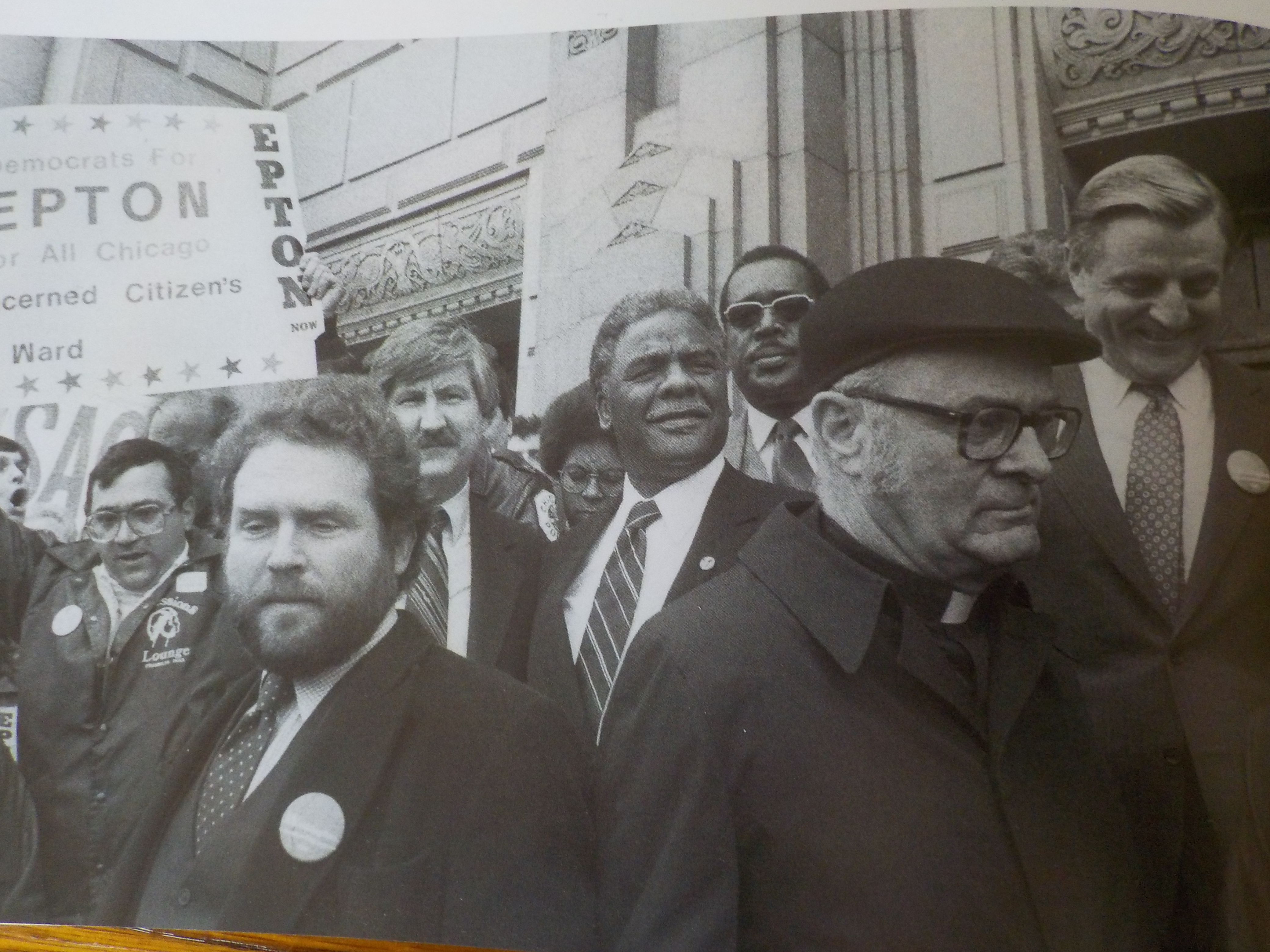
Holewinski was in the national spotlight on Palm Sunday 1983, as he escorted Washington and Walter Mondale into St. Pascal’s in Chicago’s Northwest Side amid an unruly crowd. He died way too young in 2017. (FULL DISCLOSURE: Mike was among this author’s favorite people in politics.)
Chicago Hosts Prominent Poles
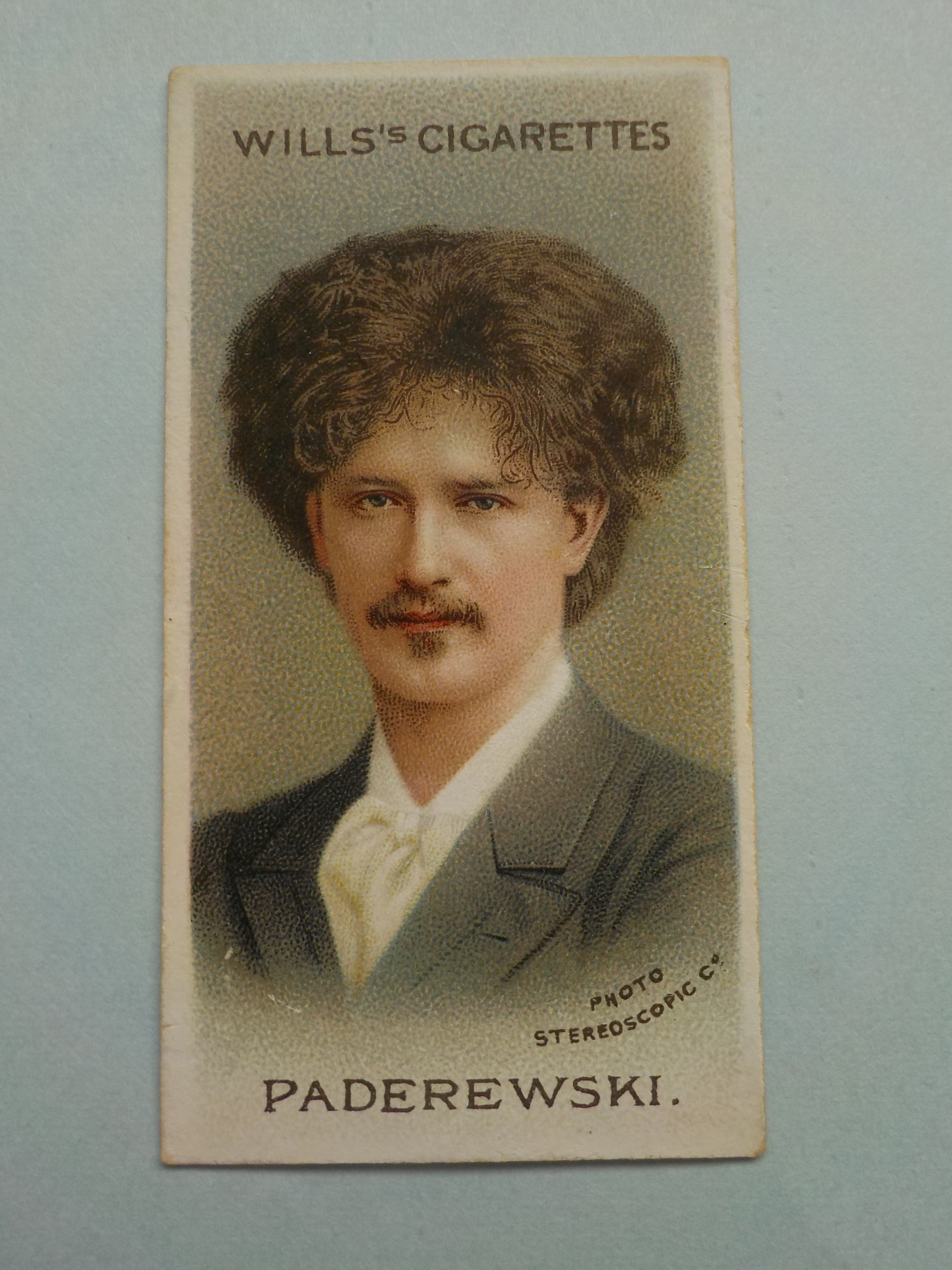
What could top Ignacy Paderewski’s visits to Chicago? World’s greatest pianist, also activist, statesman, philanthropist. In 1932, he performed a concert on the porch of a home at 2138 W. Pierce, Chicago, once owned by trailblazer John Smulski (see below).
Paderewski helped fundraise for the Kosciuszko Monument (now by the Shedd Aquarium). (Kosciuszko has a public school named for him and almost had an Illinois town named for him, but locals felt “Monmouth” was easier to pronounce.)
1912 Wills Cigarettes Paderewski trading card
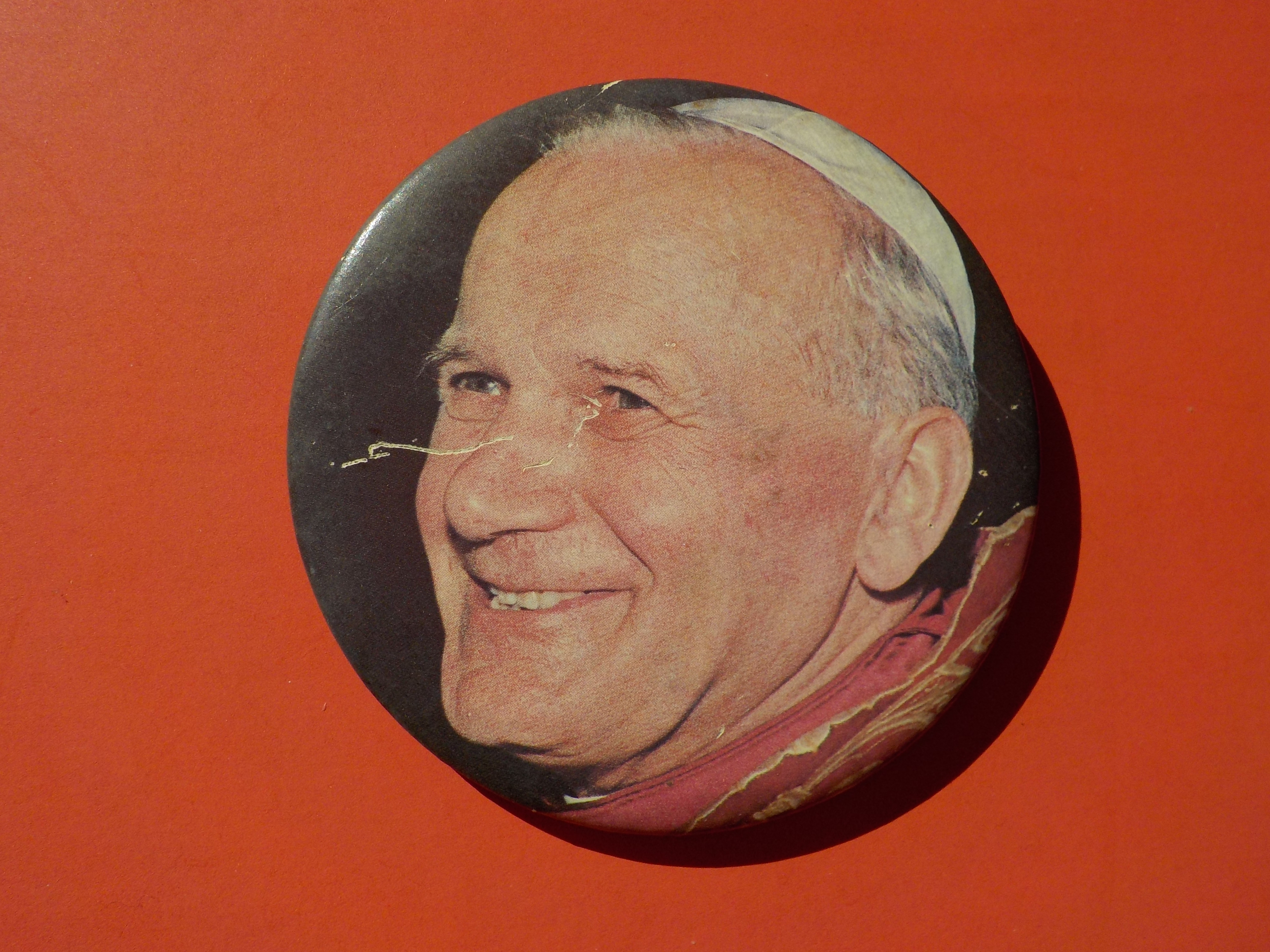
Karol Cardinal Wojtyla caused a minor stir here with his 1976 visit. But when he returned in ‘79, the eyes of the world were upon Polonia. Pope John Paul II conducted a 3-hour Mass under a sunny fall sky in Grant Park and another Mass for 20,000 faithful at Five Holy Martyrs on Chicago’s Southwest Side. Millions watched the Popemobile motor around town to Pilsen’s Providence of God Church (Papa Juan Pablo addressed the crowd in Spanish) and Quigley Seminary (where a crowd of 50,000 awaited).
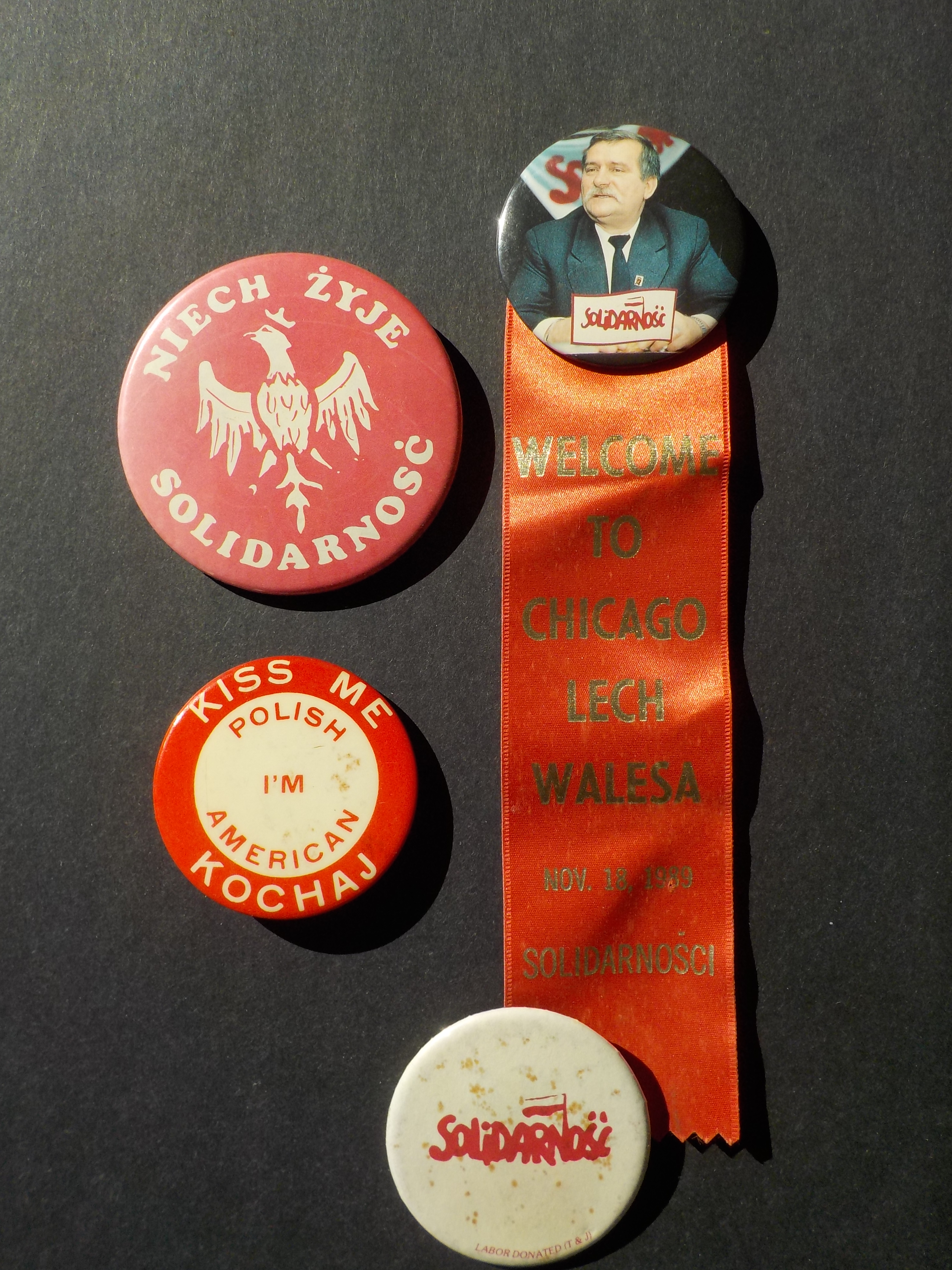
On Nov. 18, 1989, 20,000 Chicagoans braved frigid temps to see Lech Walesa, the biggest crowd of his 7-day U.S. tour. The Solidarity leader and 1983 Nobel Prize winner had addressed Congress a few days earlier. His Chicago visit prompted the State of Illinois to open a Warsaw trade office and purchase “Poland Bonds” to help rebuild Poland. Walesa was given a Bears’ helmet “on behalf of all Grabowskis”.
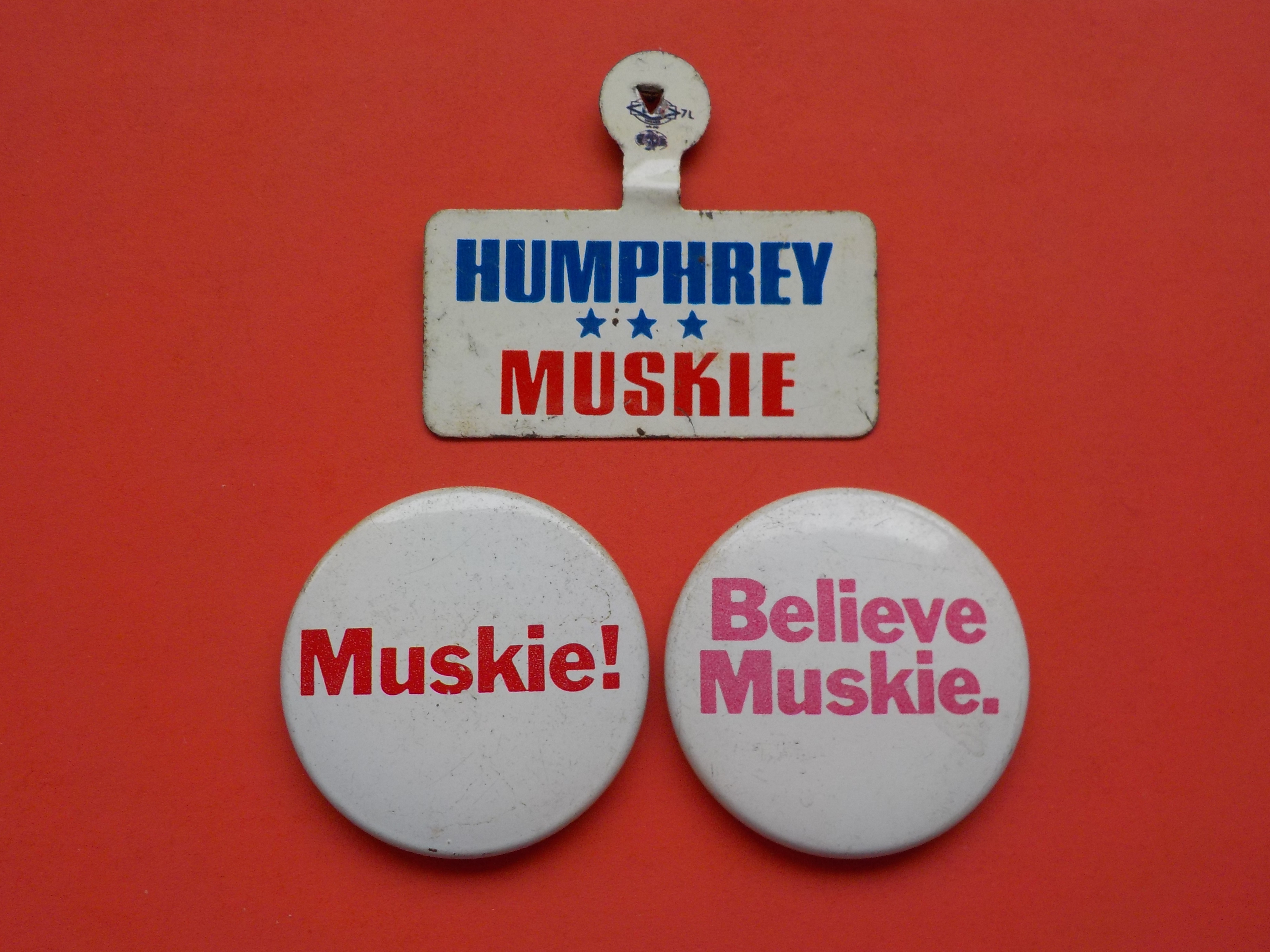
Ed Muskie (formerly Marciszewski) was a Maine man, but no stranger to Illinois, making countless stops here to court Polish-American pols, press and voters. Muskie - whose first language was Polish - accepted the VP nod at the tumultuous '68 Convention and came often during his ‘72 White House run. Illinois Polish-American pols were excited about a ticket led by a fellow Pole. 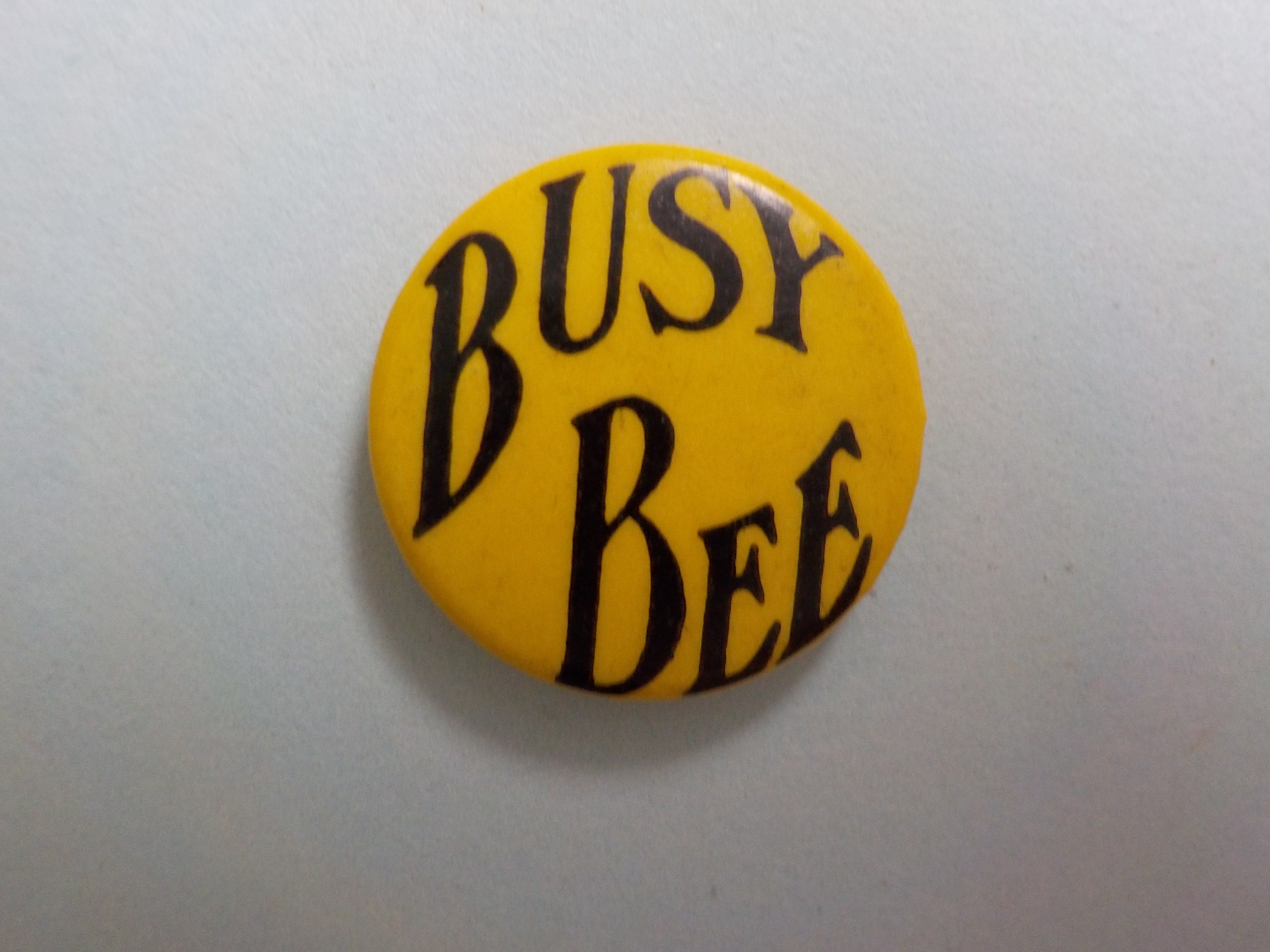 Muskie was one of many national pols who have pilgrimaged to Polonia. George H.W. Bush visited St. Hyacinth’s and, in 1992, Hillary Clinton made national news at Sophie Madej’s Busy Bee (“I suppose I could've stayed home and baked cookies”). FULL DISCLOSURE: This author was a Busy Bee regular from 1976-81, but lacked the bravery to try the Bee’s beet borscht.
Muskie was one of many national pols who have pilgrimaged to Polonia. George H.W. Bush visited St. Hyacinth’s and, in 1992, Hillary Clinton made national news at Sophie Madej’s Busy Bee (“I suppose I could've stayed home and baked cookies”). FULL DISCLOSURE: This author was a Busy Bee regular from 1976-81, but lacked the bravery to try the Bee’s beet borscht.
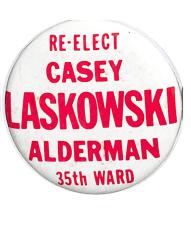
Pols on Parade: Casey “The Undertaker” Laskowski Chicago has a long tradition of politically-active morticians and Laskowski Funeral Home has been holding wakes since 1948. Casimir Laskowski was elected 35th Ward Alderman in 1955, and served until he was buried in 1979 by ex-ally, John Marcin (the long-time City Clerk who’d just been dumped by Party Bosses seeking a “fresh face”: Walter Kozubowski).
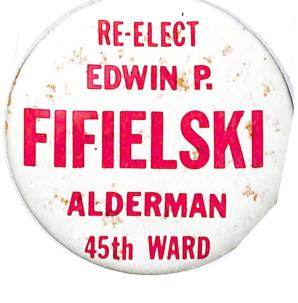
Ed Fifielski and Casey Laskowski came from different parts of the jungle, but used the same button-maker.
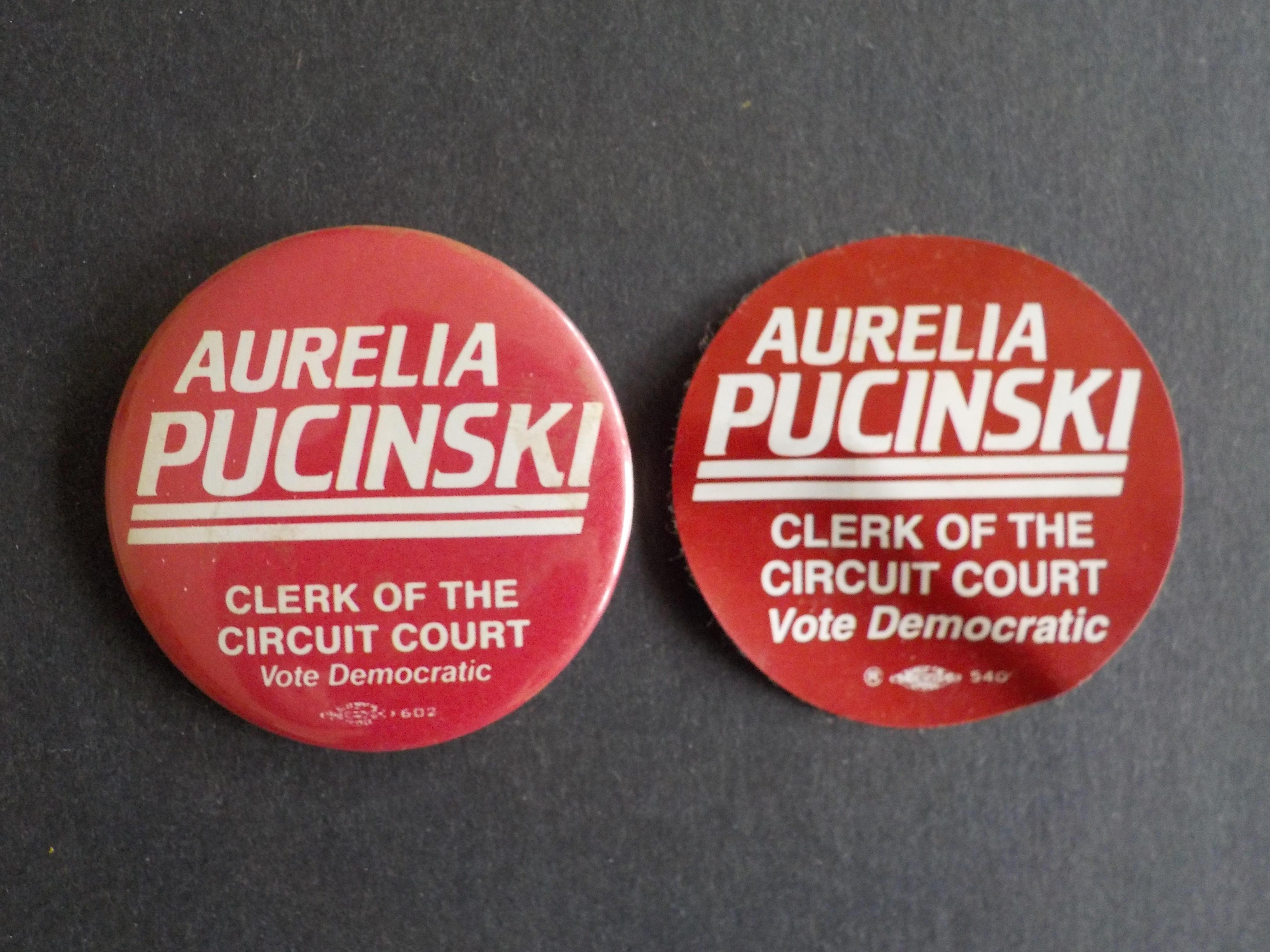
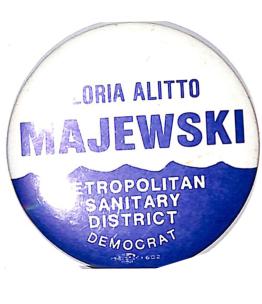
Pols on Parade: Gloria Majewski and Aurelia Pucinski Northwest Sider Chester Majewski served 3 terms on the old Metropolitan Sanitary District (now MWRD) until his death in 1984. He reached for the brass ring in ‘82, when he sought slating for Lieutenant Governor. Had he been on the ticket, who knows, maybe Adlai would’ve won, and “Stevenson-Majewski” could’ve deterred the 1986 LaRouche Disaster? (See Gallery #7 “Adlai & the LaRouchies”) Chester's Water Rec seat was taken by his wife. While of Italian descent, Gloria Alitto Majewski was popular among Polish voters (and Rosty), serving until 2010 and becoming the first woman to Chair the agency's Finance Committee.
Speaking of the LaRouche Debacle, another Water Rec Commissioner was unfortunately enmeshed in it. Dem standard-bearer Stevenson - hoping to avenge his razor-thin 1982 loss to Jim Thompson - recruited Aurelia Pucinski to take on Secretary of State Jim Edgar. When she and Adlai’s Lt. Guv running mate lost the low-turnout Dem Primary to 2 fringe candidates with vanilla-sounding names, the ticket was toast. In 1988, Aurelia Pucinski was elected Clerk of the Circuit Court, where she served 12 years and computerized the vast system. She was elected to the Circuit Court in 2004 and Appellate Court in 2010.
Trailblazers’ Timetable

1888 Republican August Kowalski beats Kiolbassa by 150 votes to become first Polish-American Chicago Alderman. Kowalski married into Polonia’s pioneering Schermann family.
1891 Kiolbassa is first Pole elected citywide in Chicago. As City Treasurer, Kiolbassa earned the nickname “Honest Pete” for returning $44,000 in interest accrued on City bank accounts to taxpayers instead of pocketing it (then a common practice). In 1896, Kiolbassa ran for Alderman again, this time beating another fellow Pole (John Smulski, see below). Kiolbassa also oversaw Chicago’s Buildings and Public Works Departments, and his name was floated for Governor in the 1890s. He died in 1905 and is buried - along with many Polonia pioneers - in St. Adalbert Cemetery in Niles.
1902 Stanley Kunz is elected first Illinois Polish-American State Senator (see below).
1906 John Smulski beats fellow Pole N.L. Piotrowski to be elected first - and only - Polish-American Illinois State Treasurer. Smulski was also a Chicago Alderman, City Attorney, Park Commissioner, banker and leader in Polish relief efforts (for which he earned the French Legion of Honor medal, likely the only Alderman to do so). In 1928, Smulski met a sad end in the Seneca Hotel, but four years later pianist Ignace Paderewski performed a concert on the porch of Smulski’s old home at 2138 W. Pierce, Chicago.
1917 Pres. Wilson names Polonia powerhouse Julius Smientka to be sorta Regional IRS Director. Smientka - ally of Mayor “Pushcart Tony” Cermak - gets on the Federal Reserve Board in 1933. Another Polonia product - Anthony Czarnecki - is named Customs Collector by Pres. Coolidge.
1920 Stanley Kunz is elected first Illinois Polish-American Congressman, the first of six terms. A 30-year Chicago Alderman, Kunz has been called Chicago’s first Polish “Boss” (also “Sluggin’ Stanley” and “The Terrible Pole”). Another Illinois Pole joins him in 1930: Leonard Schuetz.
1922 Respected jurist Edmund Jarecki is elected Cook County Judge and overseer of the election board, where he serves for 32 years.
1930 Joe Rostenkowski is elected State Rep, then 32nd Ward Alderman.

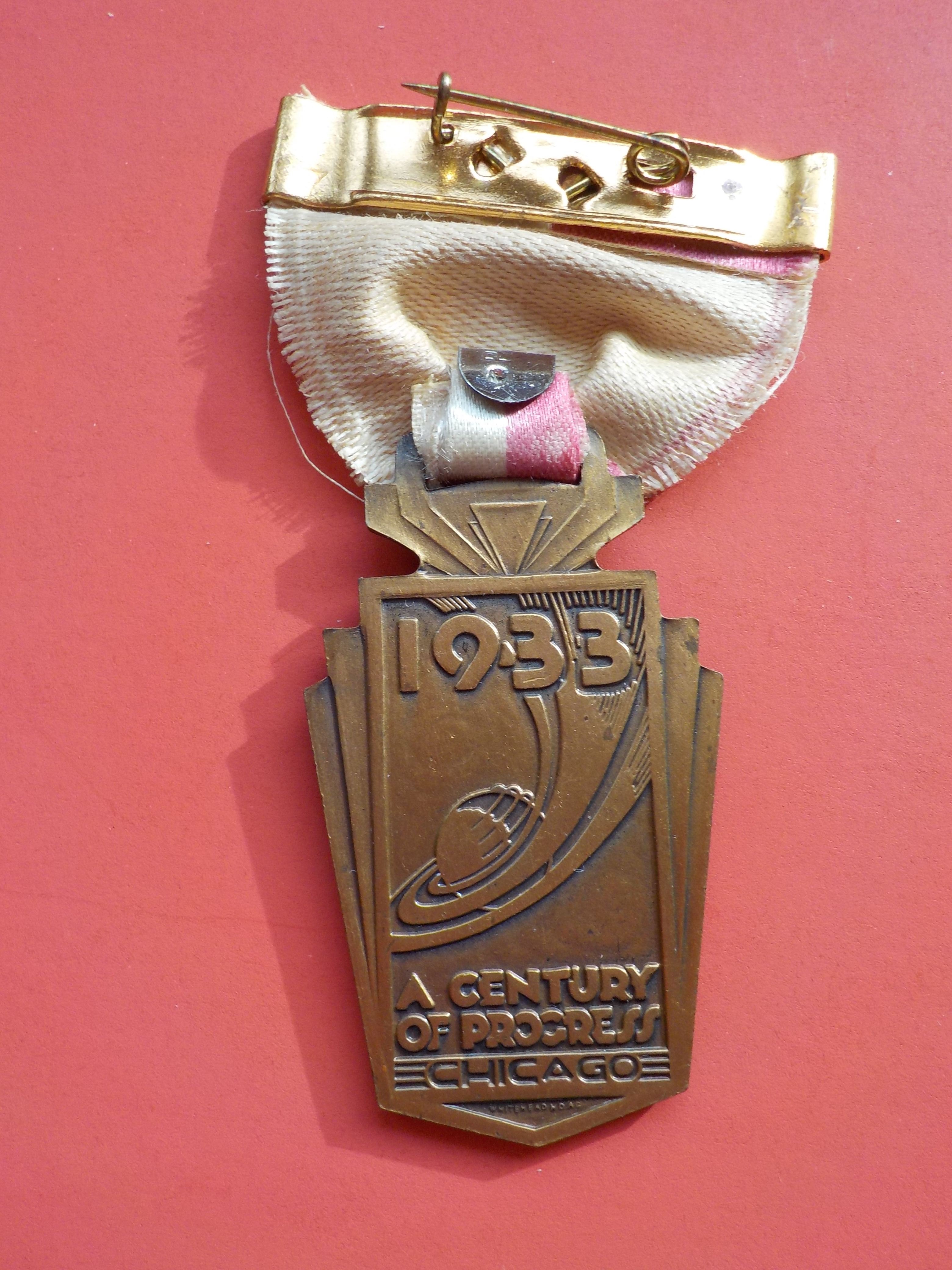
"Polish Week of Hospitality, Chicago, July 17-23, 1933" The front of the pin honors Generals Washington, Kosciuszko and Pulaski.
July 17-23, 1933 “Polish Week of Hospitality” at Century of Progress Expo. The eyes of the world were on Chicago Polonia during this global gala. Not only were Poles the 2nd-largest ethnic group in Chicago and helped build the fairgrounds, but a world art competition at the fair was won by Stanislaw Kaczor-Batowski’s “Pulaski at Savannah”. In 1934, the inspiring painting was moved to the Art Institute, where it was unveiled by Eleanor Roosevelt. It now hangs in Chicago’s Polish Museum of America.

December 12, 1933 Chicago’s “Crawford” Avenue is renamed “Pulaski”. Originally “40th Ave” (40 blocks west of State), the change comes after years of lobbying by Polonia community groups and opposition by local merchants. The change is backed by Mayor Kelly, who easily fends off a 1935 Primary challenge from activist Martin Powroznik, the first serious Polish-American Chicago Mayoral contender. Polish voters were split, giving Powroznik just a third of their votes.
1951 Lillian Piotrowski elected first Polish-American woman in the Illinois General Assembly. (See 1969, below).
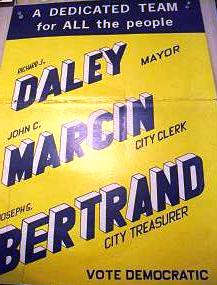
1955 John Marcin is elected first Polish-American Chicago City Clerk, serving a record 24 years. When he files for re-election in ‘70 on Daley the Elder’s slate, they submit a 10’-high petition pile.
1956 Ben Adamowski is elected first - and only - Polish-American Cook County State’s Attorney. He fought gambling dens and traffic ticket-fixing, and - with help from the “Babbling Burglar” - prosecuted the CPD Summerdale Scandal.
1959 Illinois voters send four Polish-Americans to Congress (Kluczynski, Derwinski, Pucinski, Rostenkowski) a record lasting 14 years (see above).
1969 Trailblazing Polish-American Lillian Piotrowski is first woman named Dem Committeeman (22nd). A probation officer and teacher, she served in the House (1951-64) and on the Cook County Board (1964-74).
Today, Piotrowski Park (Keeler & 31st, Chicago) is named in her honor. 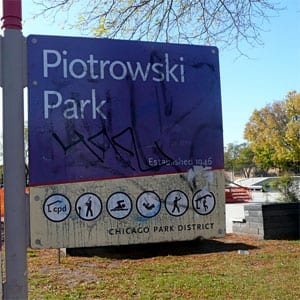
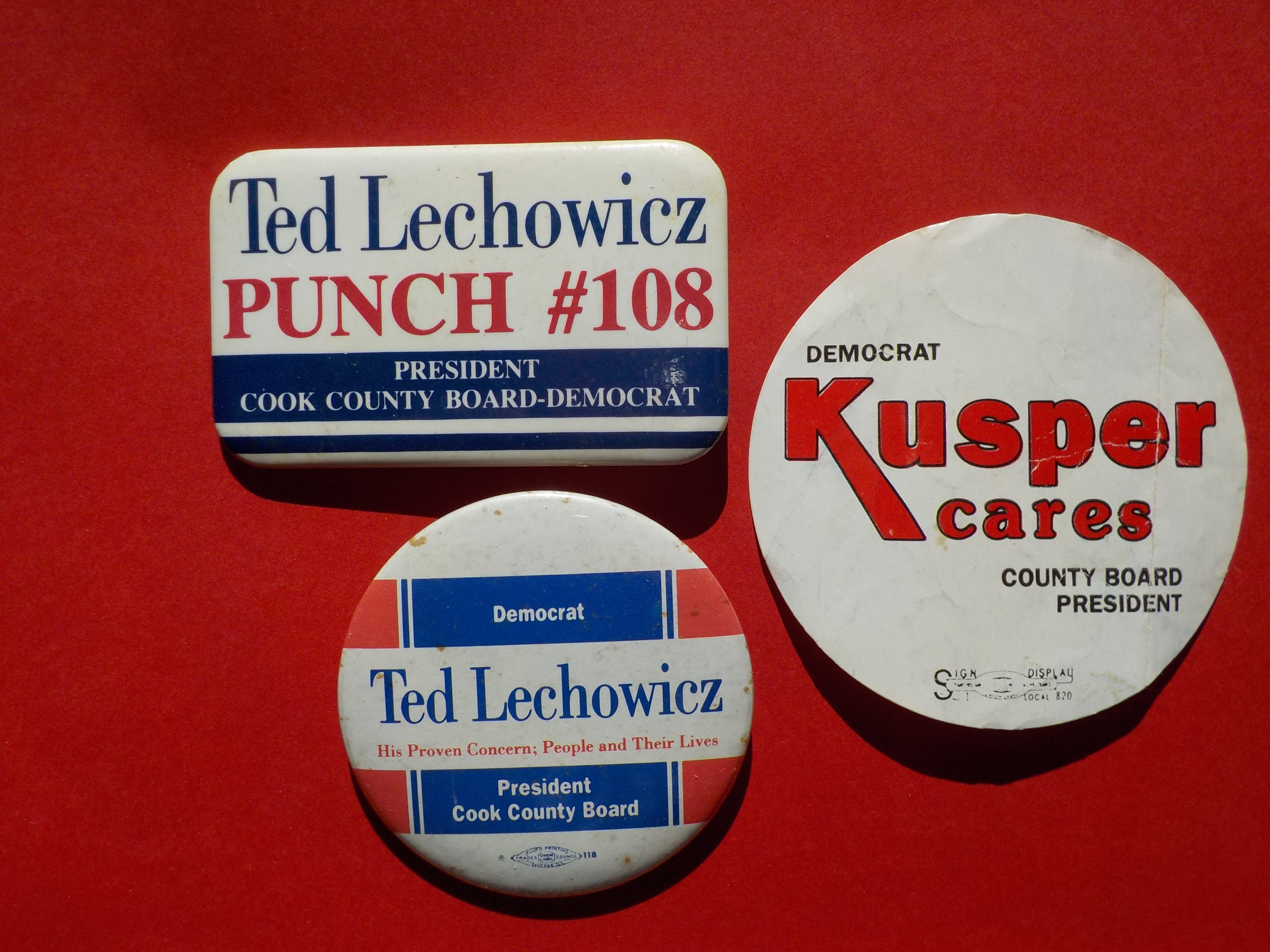
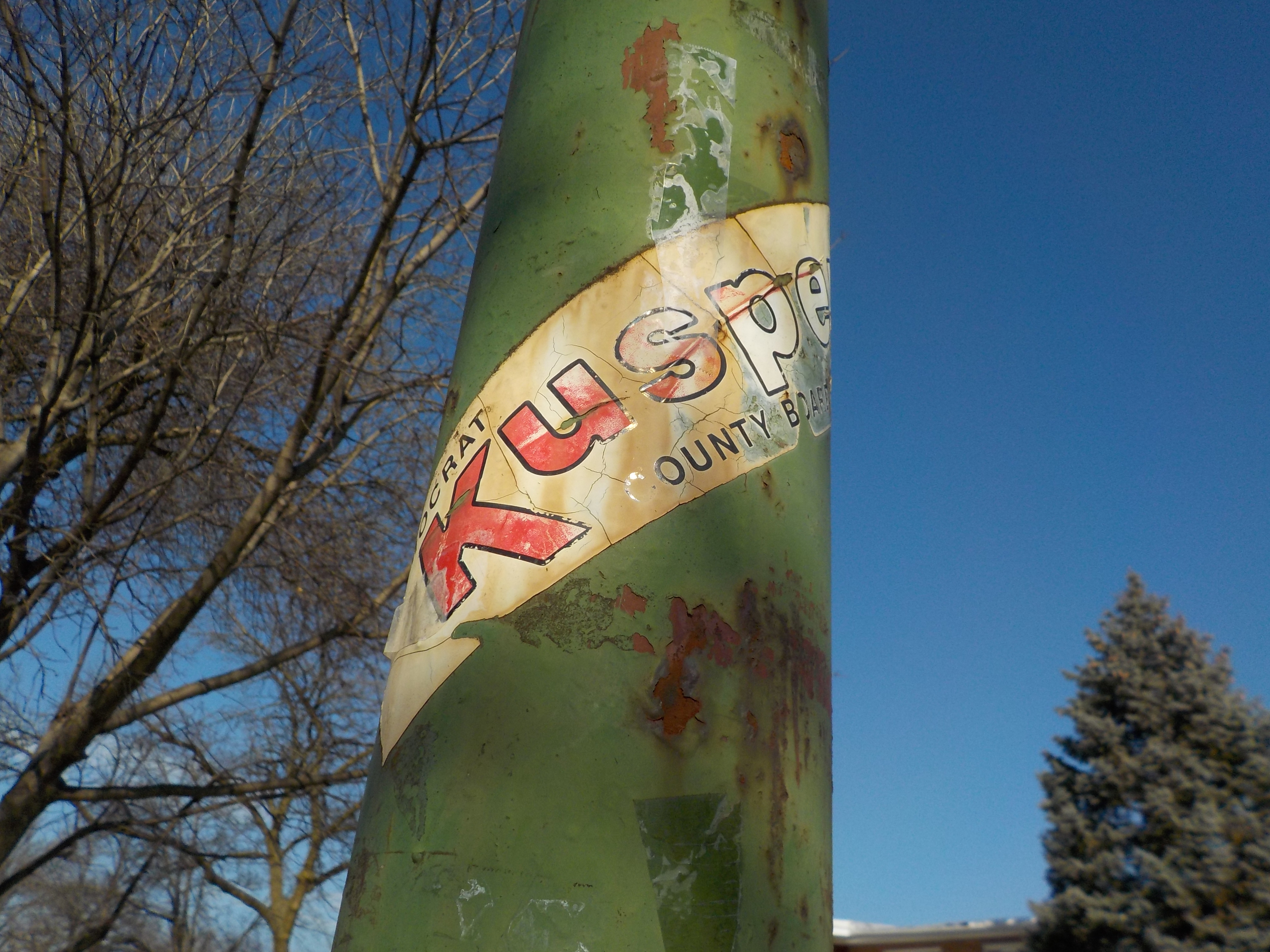 1990 “Armageddon” is how analyst Russ Stewart described the Cook County President war between two veteran NW Side Polish-Americans pols: Ted Lechowicz and Stanley Kusper. They split the vote, finishing 3rd and 4th.
1990 “Armageddon” is how analyst Russ Stewart described the Cook County President war between two veteran NW Side Polish-Americans pols: Ted Lechowicz and Stanley Kusper. They split the vote, finishing 3rd and 4th.
Lechowicz - a one-time Rosty protégé - served 12 more years on the County Board. But this was the end for Kusper, a 2nd-generation pol who I think about every day, since this pole is outside my window. Stan's long gone, but once again, the campaign item outlives the candidate or cause.
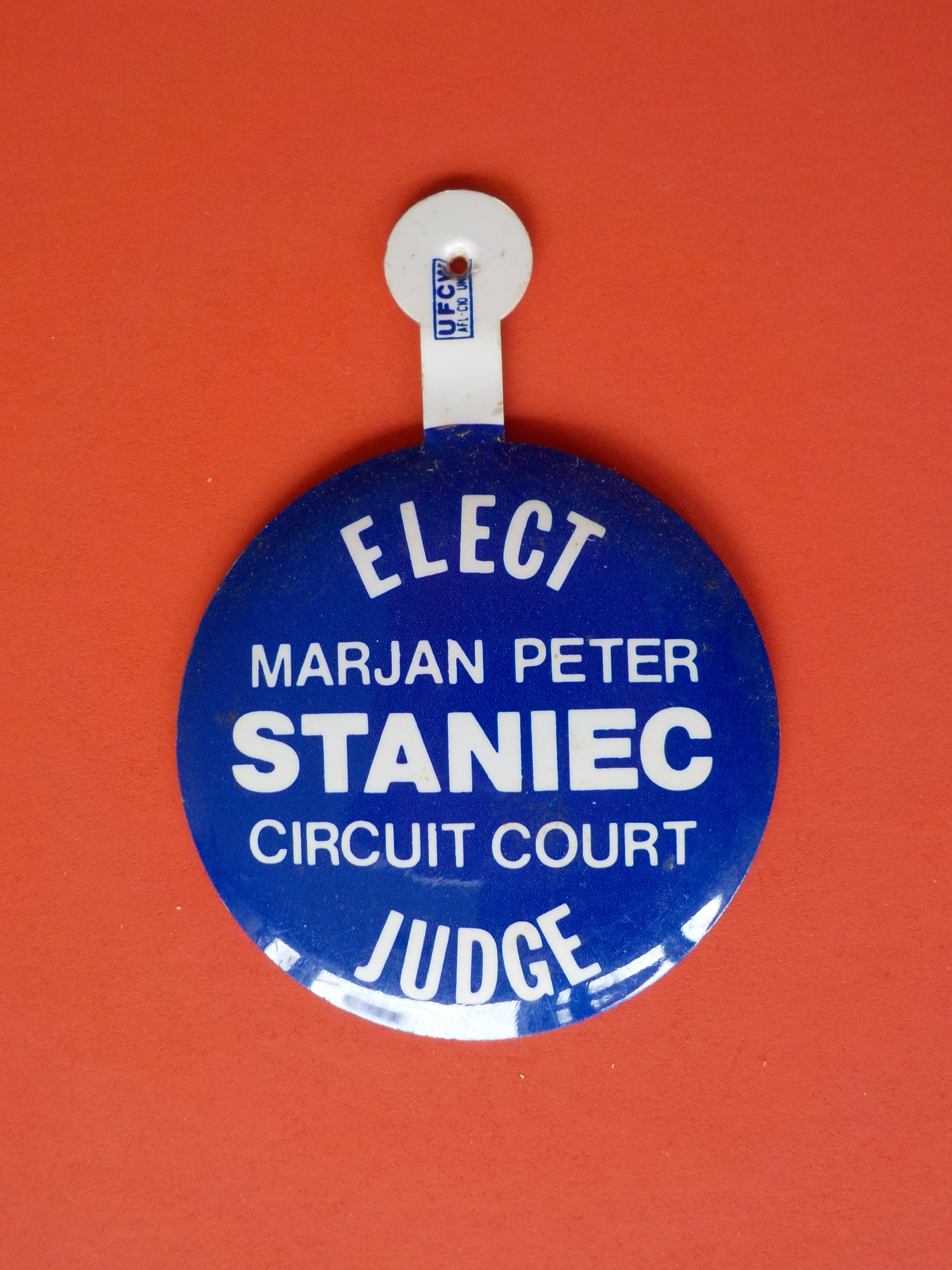
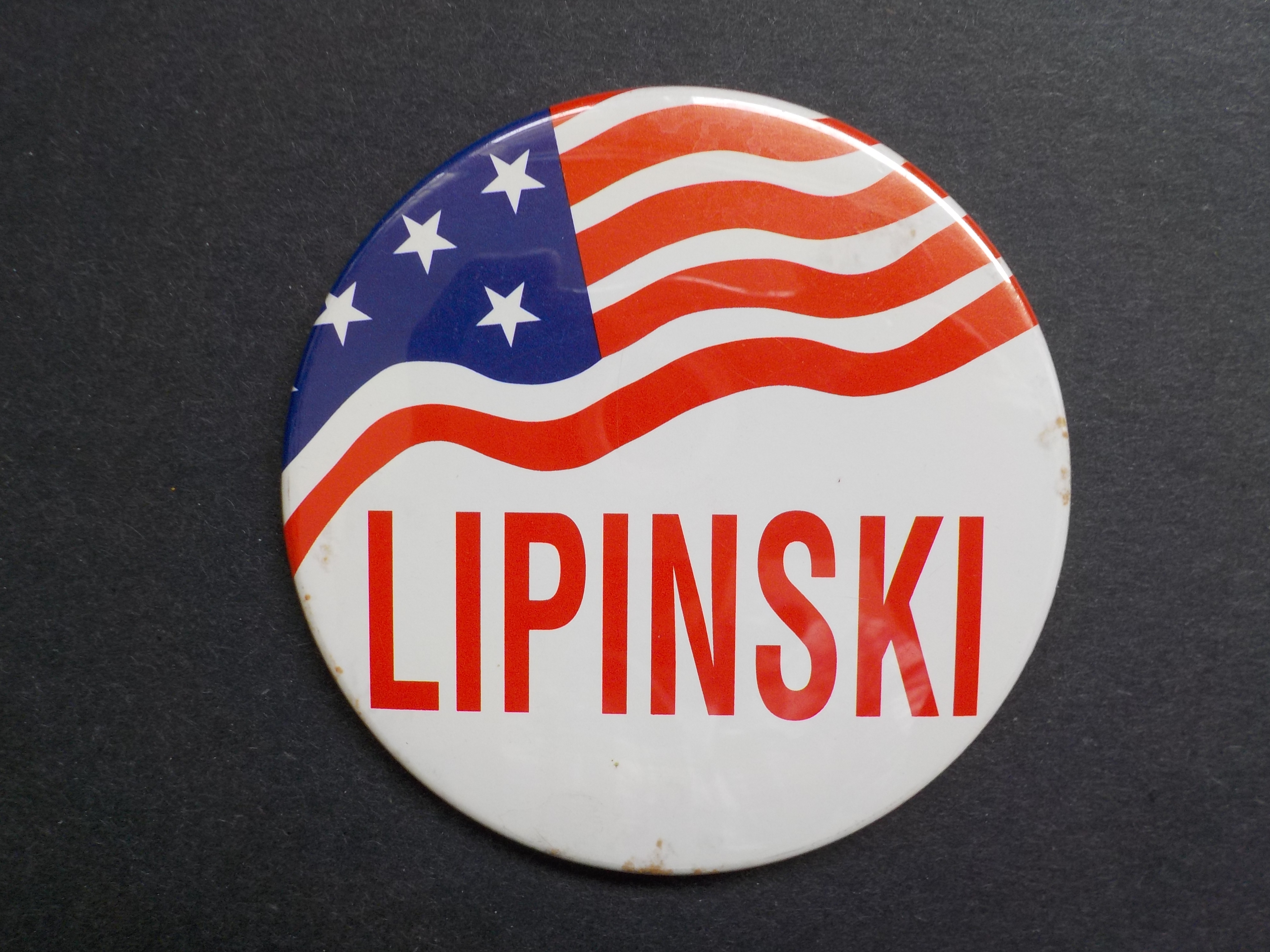
Polish Pols on Parade: Marjan Peter Staniec Son of Polish immigrants, Marjan Peter Staniec was a money advice columnist, Social Security administrator, Loyola Law prof and, in 1976, named Circuit Court Judge. Staniec helped draft the landmark “Illinois Senior Citizen Bill of Rights of 1993”.
Pols on Parade : The 23rd Ward and Lipinskis In 1975, Daley the Elder named Bill Lipinski (“Lip the Elder”) 23rd Ward Dem Committeeman. He parlayed that into an Aldermanic, then U.S. House seat. A “Blue Dog Democrat”, he used his Transportation Committee post to build the CTA Orange Line and more. In a classic Chicago move, Lip the Elder handed-off the seat in ’05 to his college prof son, “Lip the Younger”. Another Blue Dog, Dan Lipinski serves on the House Transportation & Infrastructure Committee and is the sole Pole in the Illinois Congressional delegation. (Lip the Elder won his seat by beating incumbent and fellow Pole John Fary who had led efforts to modernize Midway Airport; nephew Mark Fary was 12th Ward Alderman.) Subsequent Aldermen were Bill Krystyniak (Ald. Potempa’s ex-aide) and Jim Laski (Lip the Elder’s ex-aide…got that?) In ‘95, Laski was succeeded by Mike R. Zalewski, whose recent retirement left the Chicago City Council without a Polish-American voice. His son, Michael J., is a State Rep.
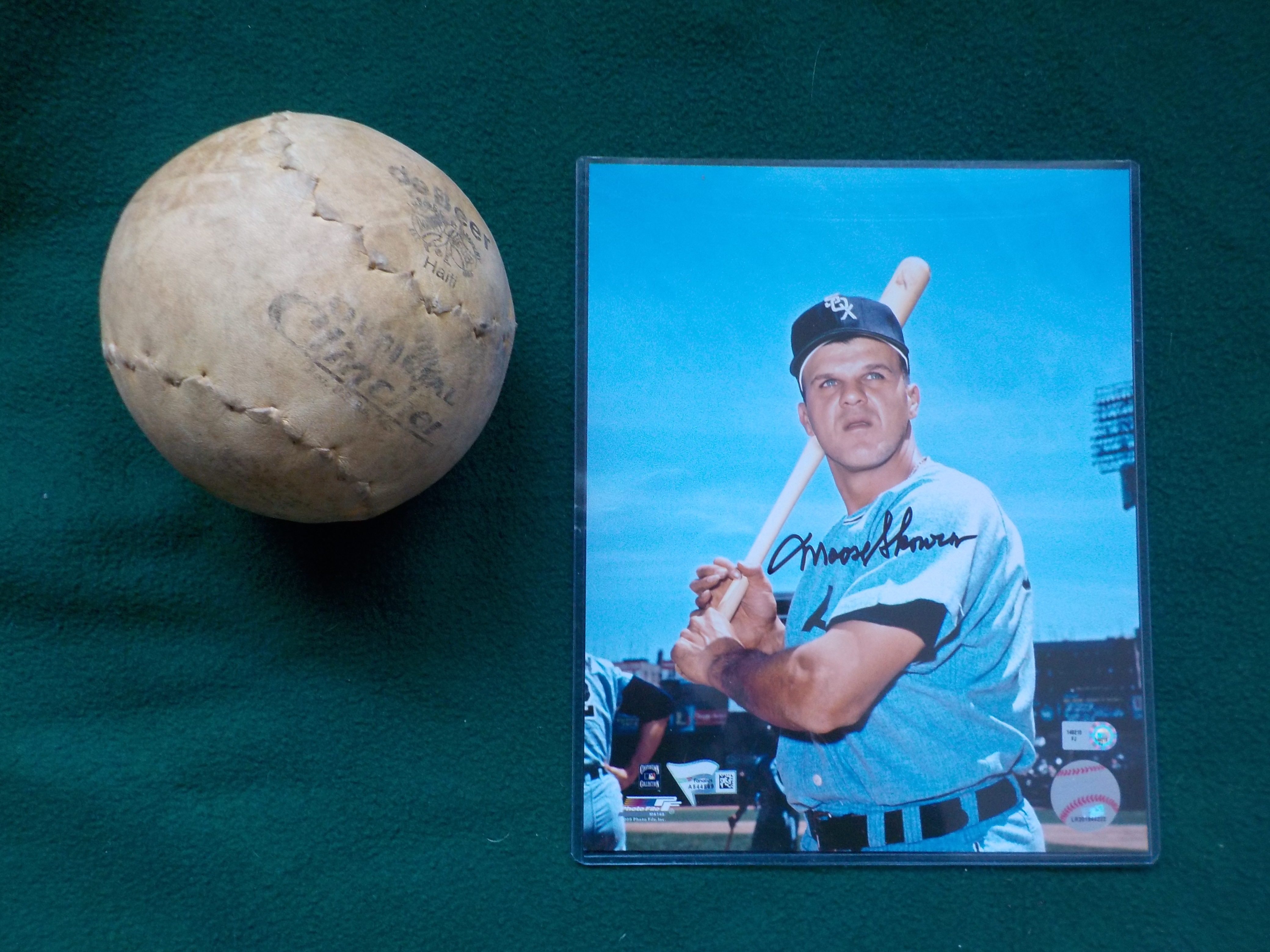
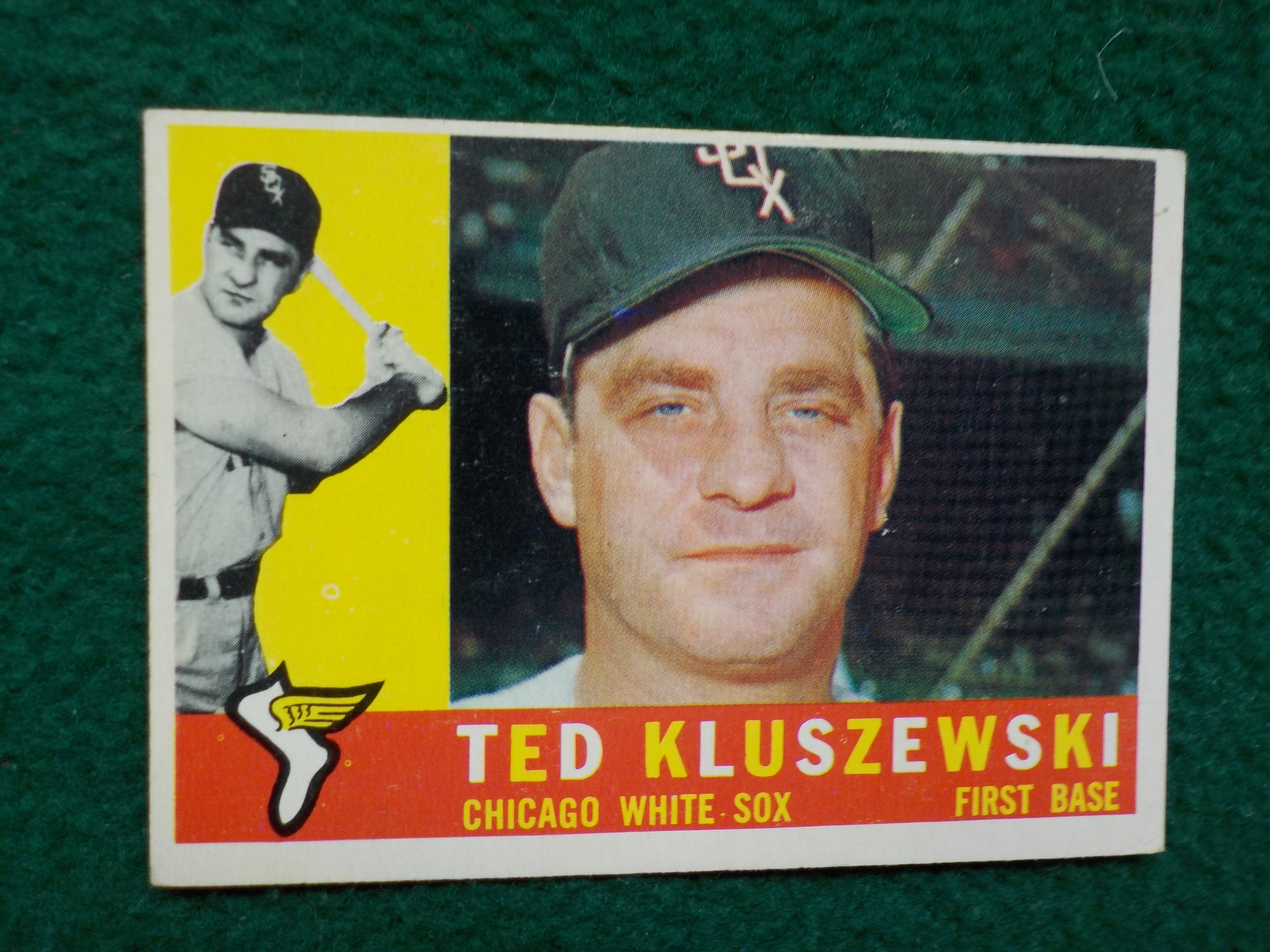
Play Ball! They never ran for office, but scored 1,500 runs between them. Two of baseball’s greatest sluggers - both National Polish-American Sports Hall of Fame inductees - are products of Chicago Polonia: Ted “Big Klu” Kluszewski and Bill “Moose” Skowron.
Poland’s and Polonia’s contributions to America’s Pasttime are deep-rooted. According to “The Secret History of Baseball” a bat-and-ball game called “palant” was played in Poland for centuries, and may have been toted to Virginia by Polish settlers in the early 1700s. Later, Polish kids in remote communities were playing “schlagball”, an Austrian import. The first Polish-American player in the Bigs? Oscar Bielaski, who learned to play while serving as a Civil War drummer boy. He ended his career with the Chicago White Stockings in 1876. The first Polish-born player was Henry “Pep” Peplowski, who played in a 1929 Boston Braves infield with Rabbit Maranville and Johnny Evers of Tinkers-to-Chance fame.
Other Polish-born players followed, but - like Pep - they were all glove, no stick. It wasn’t until Moe Drabowsky - a pitcher - hit the first MLB homer by a Polish-born player (1957 with the Cubs). In 1987, Drabowsky and Stan Musial toured Poland, hoping to boost the game. Since their trip, the town of Kutno (west of Warsaw) has hosted the European Little League Baseball Center and annual tourneys.
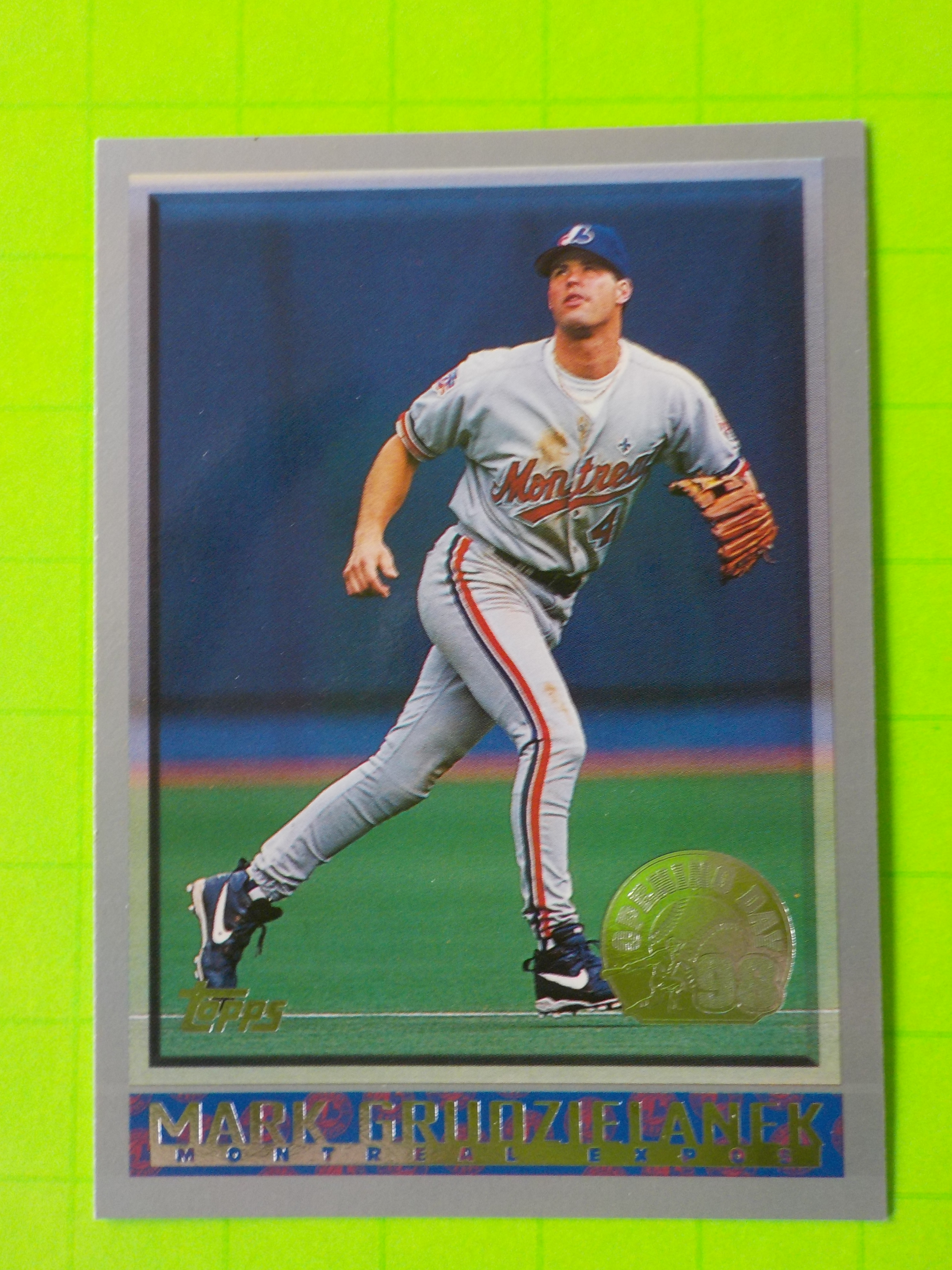 BREAKING NEWS! The National Polish-American Sports Hall of Fame just announced its 2019 inductees including Cubs infielder Mark Grudzielanek. (1998 Grudzielanek card)
BREAKING NEWS! The National Polish-American Sports Hall of Fame just announced its 2019 inductees including Cubs infielder Mark Grudzielanek. (1998 Grudzielanek card)
8-time All-Star Bill Skowron honed his place-hitting skills as a 16” softballer on such snug fields as Thillen’s Stadium and Kells Park. Moose made history at 17, when - playing for the legendary Kool Vent Awnings - he launched a Clincher into a building at Chicago & Kedzie some 400’ away; it’s been called the “longest hit in Chicago softball history”. A big guy, (he took dance lessons for his footwork), Moose’s nickname actually came when a bad haircut given by his grandfather bore resemblance to Mussolini. N.L. HR leader with the Reds in 1954, Kluszewski was part of the ‘59 Go-Go White Sox. Chicago auto dealer Jim Moran offered a free car to anyone who homered in the World Series; Klu earned 3 Ford Falcons! Not just a Big Bopper, he led 1st Basemen in fielding percentage 5 times. He attended the same school as my grandmother (Argo High…see below).
Illinois Polish-Americans have long excelled in sports, and many notables have either grown up or played here, such as:
Baseball: Hall of Famer Al (Szymansk) Simmons, Hank Borowy, Moose Skowron, Ted Kluszewski, Moe Drabowsky, Mike “The Polish Prince” Krukow, Paul Konerko, Greg “Bull” Luzinski, Dick “Monster” Raddatz, Joe Borowski, Mike Bielecki, Doug Drabek, Joe Niekro, Art Shamsky, “Steady Eddie” Lopat, Matt Szczur, Tom Paciorek, Mark Grudzielanek, Richie Zisk, Brian Matusz, more. Football: Bronco Nagurski, Johnny Lujack, Ray Nitschke, Jim Grabowski, Mike Tomczak, Glen Kozlowski. Also Blackhawks Eddie Olczyk, Tom Lysiak and Jim Wisniewski. Plus boxer Tony Zale (Gary’s “Man of Steel”) and Duke’s Mike “Coach K” Krzyzewski.
Until 2016, Hank Borowy, was the last Cubs pitcher to win AND lose a World Series game (1945 against Detroit); Jon Lester did it in 2016. Borowy was also the last MLB pitcher to double twice in the same inning. Dick “Monster” Radatz and Mike Krukow were keys to Cub play-off runs.
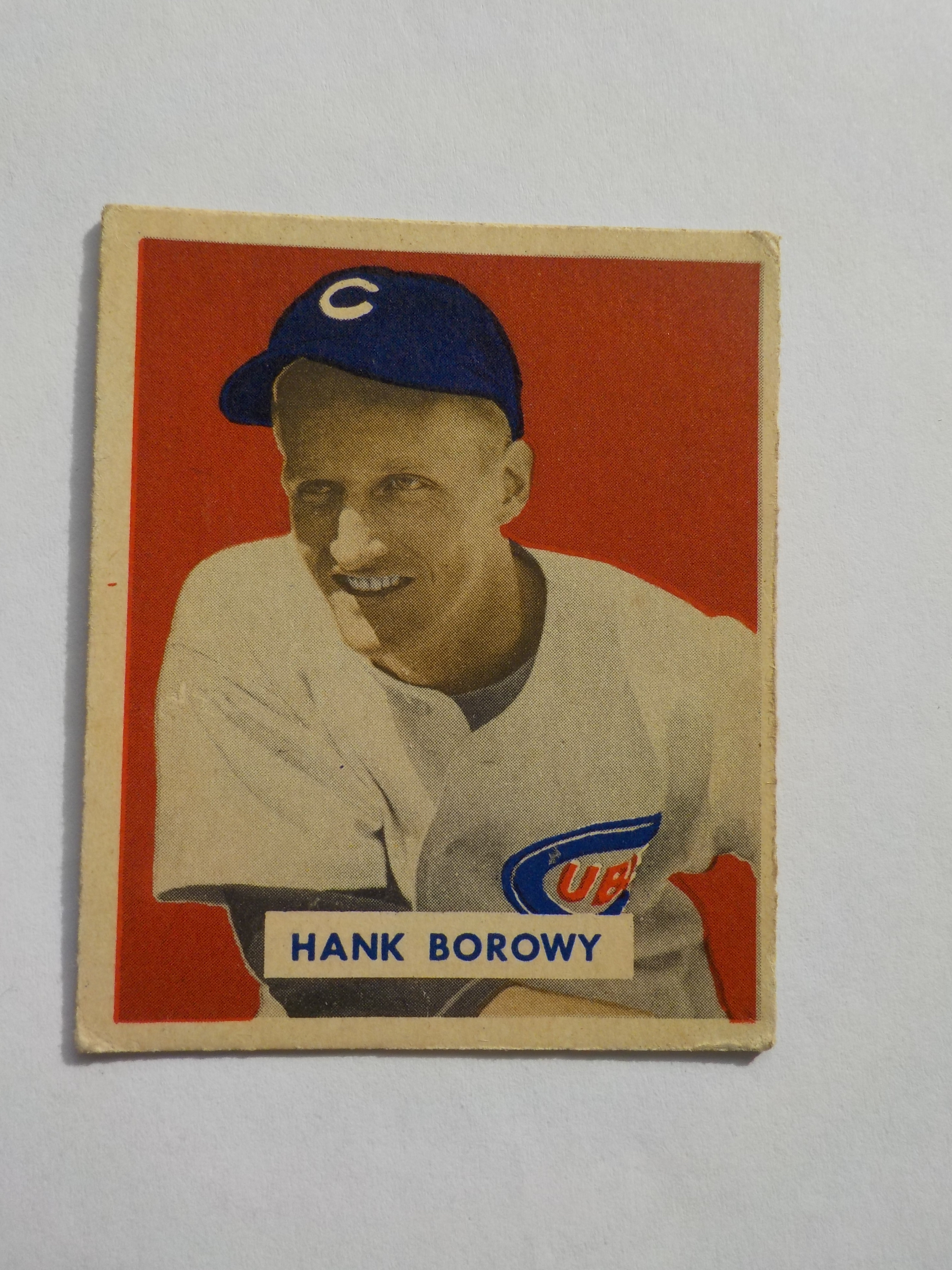
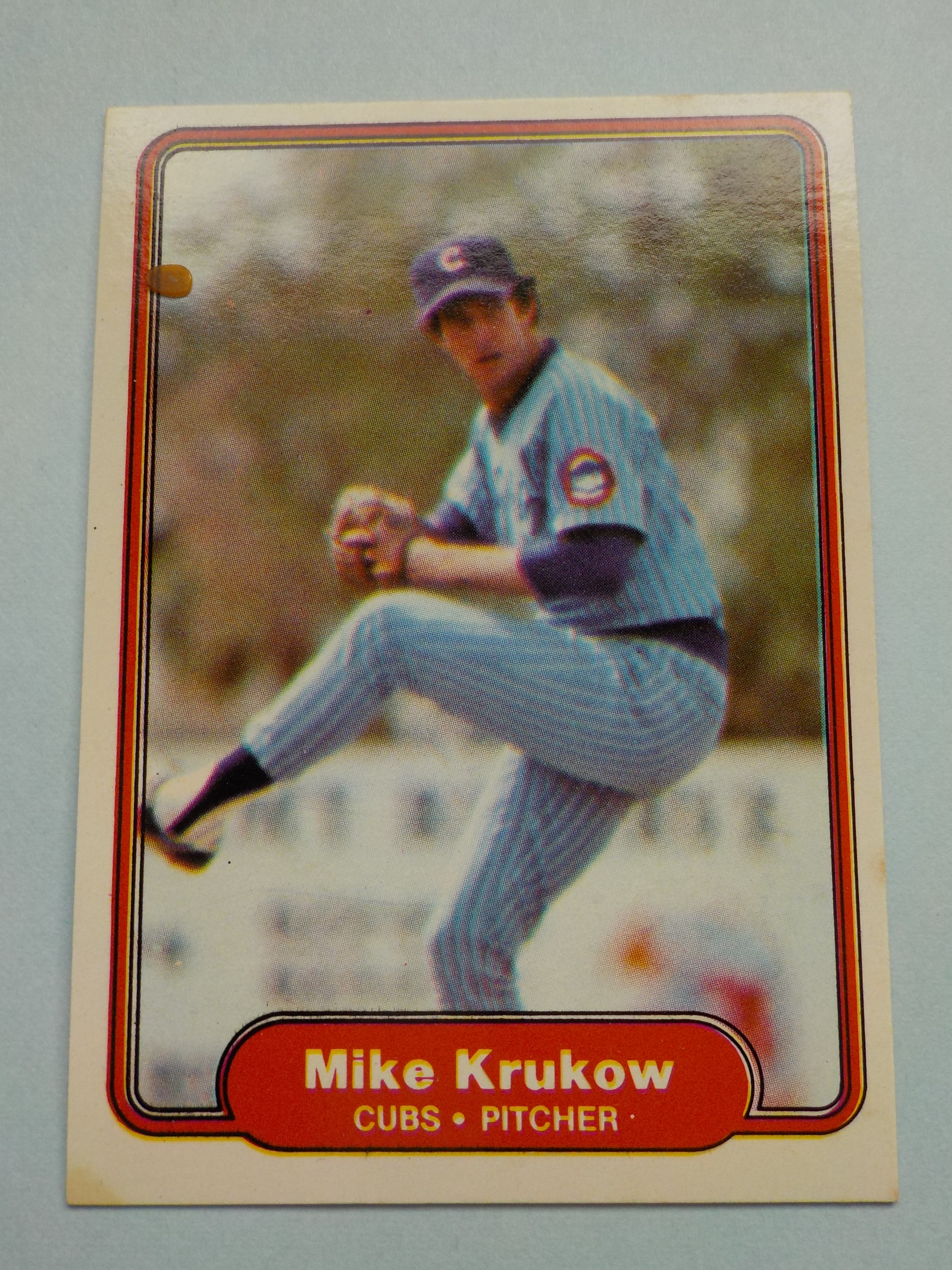

Troy Tulowitzki was a “Cub Killer”, who played here often. In fact, he hit for the cycle against the Cubs in 2009, becoming only the 2nd player in MLB history to hit for the cycle and perform an unassisted triple play. Other greats who killed the Cubs or Sox: Stan Musial, Carl Yaztremski, Phil Niekro, Tom Brunansky.
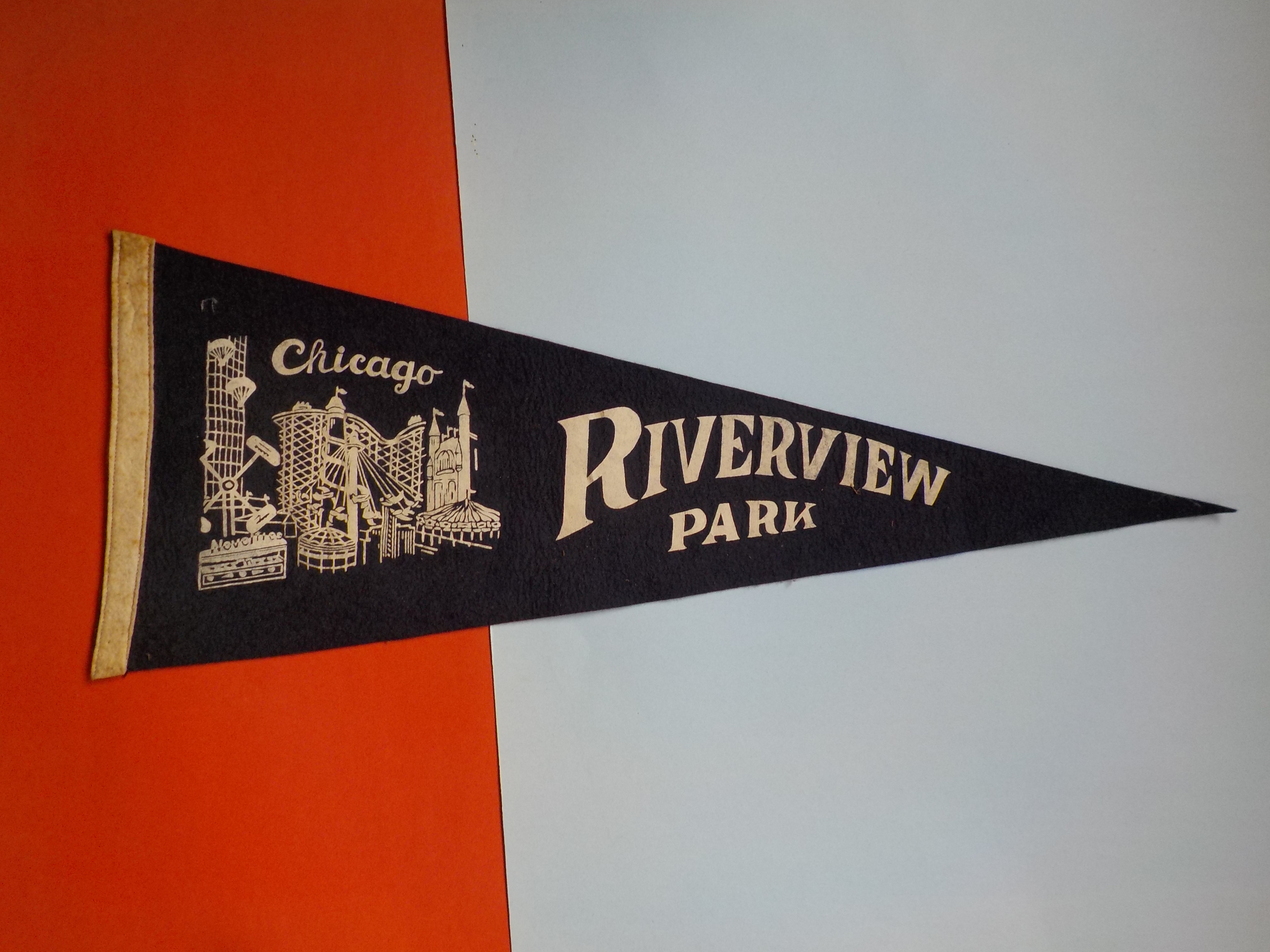
What began as a rifle range, then German beer garden, then “kiddie park”, became a favorite summer destination for generations of Chicagoans, especially Polish families from nearby Avondale hoping to “Laugh their Troubles Away”. Riverview gave everyday folks a chance to brave the “Bobs”, shoot the “Chutes” or, like me, be creeped out by Aladdin’s shifty peepers.
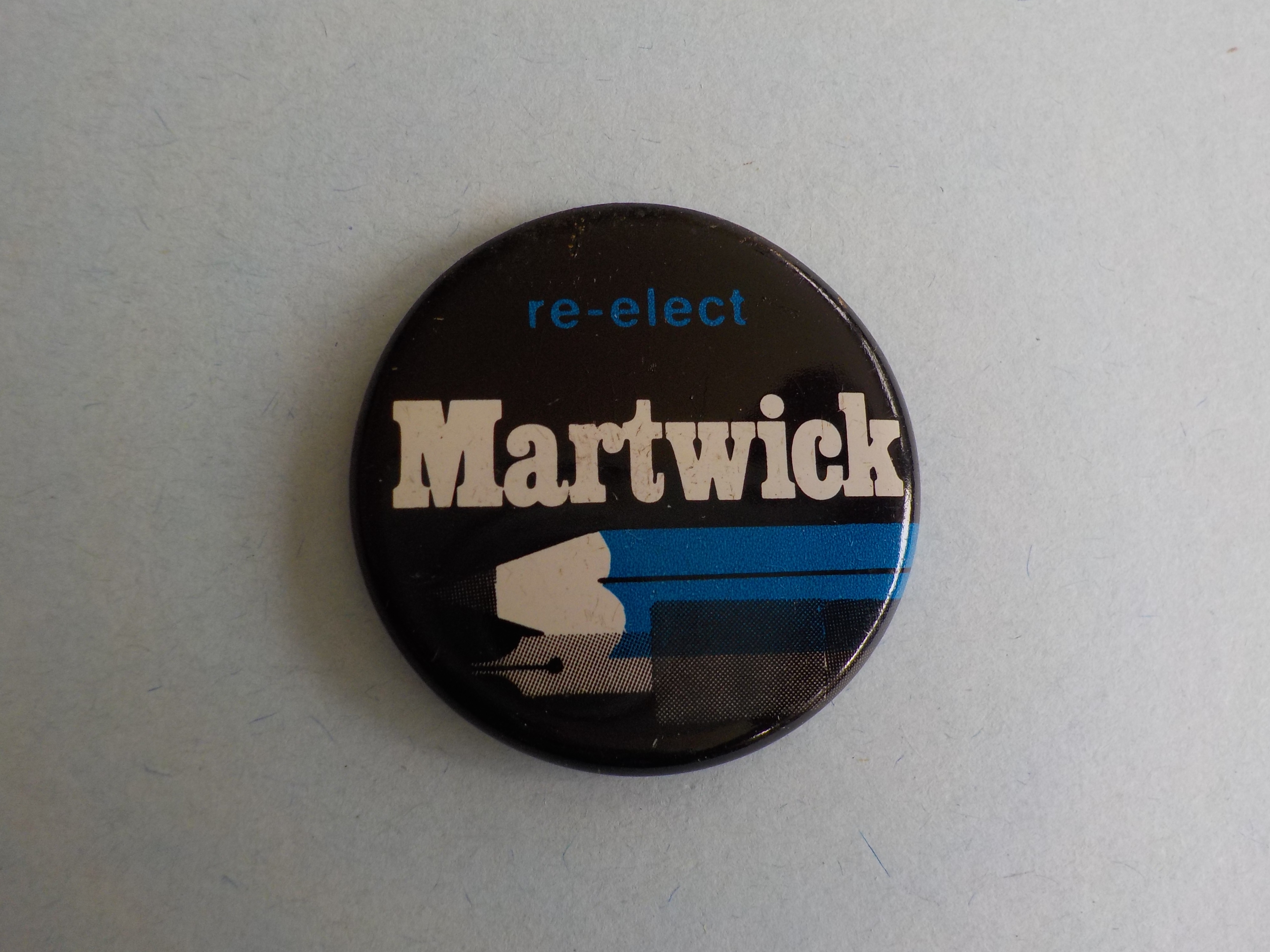
Pols on Parade: Martwicks Richard Martwick’s button for Cook County School Superintendent is super! An ink pen nib! A pencil! Martwick served in that now-defunct post for 24 years. His brother Robert, Sr., was a Dem Township Committeeman and nephew, Robert, Jr., is State Rep and 38th Ward Dem Committeeman.
Where Ya From?
Chicago political tribalism means you’re not just a Pole or a Pole from a certain parish, or from Krakow or Jackowo, or a particular faction (of which there are many). As in most ethnic communities, there are the ancient feuds, and eternal contests between “The Bosses” and “The Respectables”. Plus sheer geography. So, we’ve compiled an unofficial list by Chicago Ward of Alderman, Ward Committeemen, and local pols in the past century or so. Most are Dems; some names appear in 2 Wards due to remaps (a work-in-progress)…
7th Ward: Robert Wilinski. 10th Ward: William Pieczynski. 11th Ward: Stan Nowakowski. 12th Ward: Frank Zintak, Ed Kucharski, Art Zelezinski, John Fary, Ted & Don Swinarski, Aloysius Majerczyk, George Kwak, Mark Fary. 13th Ward: Casey Staszcuk, John Madrzyk. 22nd Ward: Frank Stemberk, Lillian Piotrowski. 23rd Ward: Joe Potempa, John Waner (Wojanarski), Frank Kuta, Bill Lipinski, Jim Laski, Dan Lipinski, “Fireman Bob” Terzich, Bill Krystyniak, Mike R. Zalewski, Mike J. Zalewski. 26th Ward: J.T. Baran, Frank Konkowski, Matt Bieszczat, Dickie Troy, Stanley Zydlo. 30th Ward: Lou Kasper, Thaddeus “Ted” Lechowicz, Mike Wojcik, Carole Bialczak. 31st Ward: Stan Adamkiewicz, Chester Kuta, Eddie Nedza. 32nd Ward: “Big Joe Rusty” Rostenkowski, Bernie Prusinski, Robert Sulski, Dan Rostenkowski, Theris Gabinski, Ted Matlack. 33rd Ward: Edmund Jarecki, Joseph Petlack, G.M. Rozczynialski, Joe Rostenkowski, Zefiryn Kadow, Vincent Zwiefka. 35th Ward: Walter Orlikowski, John Marcin, Casey (“The Undertaker”) Laskowski, Chester Hornowski, Joe Kotlarz, Mike Holewinski. 38th Ward: Chester & Gloria Majewski, the Martwicks. 39th Ward: Frank Tomczak, Walt Orlikowski. 41st Ward: Roman Pucinski, Stanley Kusper, Marjan Peter Staniec. 45th Ward: Edwin Fifielski.
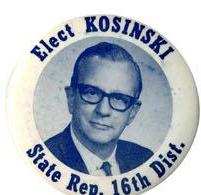
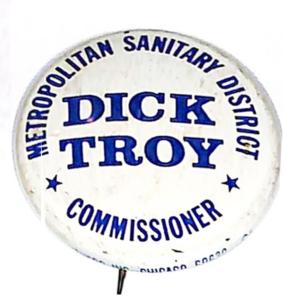
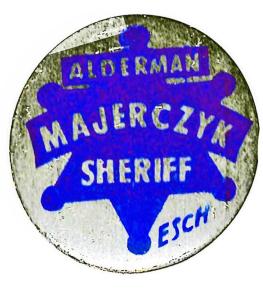
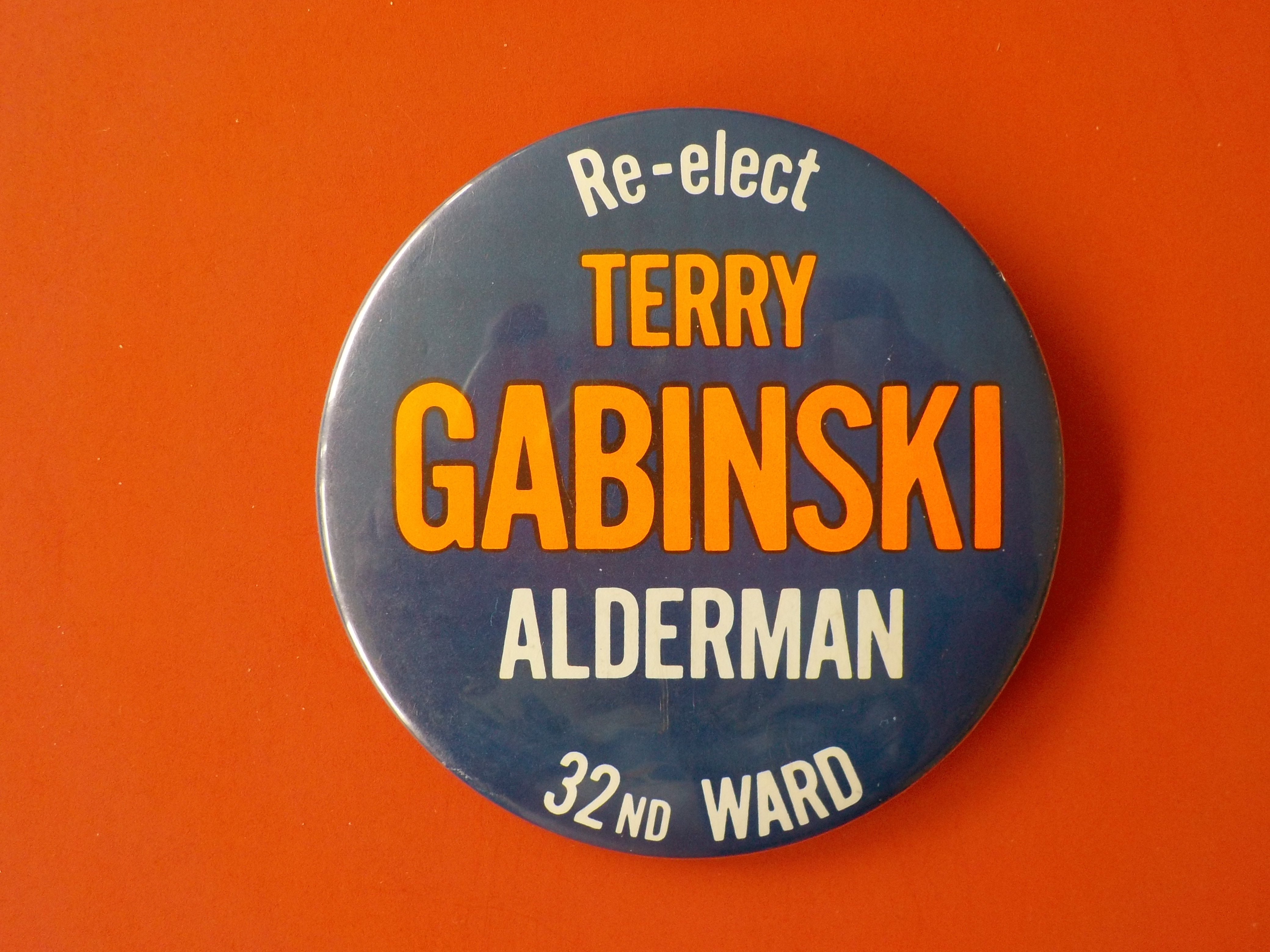
Polish Pols on Parade: Gabinski, Troy, Kosinski A chemistry teacher and Rosty aide, Theris “Terry” Gabinski was named Alderman when Robert Sulski became judge in 1969; he served 30 years. Son-in-law of 26th Ward Boss Matt Bieszczat, Water Commissioner Dickie Troy floated his name for Attorney General and Lite Guv. In the ‘70s, there were two Kosinskis in the State House: Rep. Roman Kosinski and Sen. Norbert Kosinski (who introduced the bill to make Pulaski Day an official holiday).
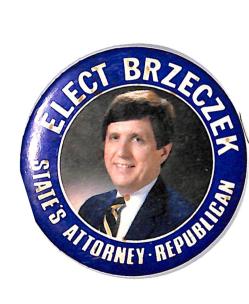 Pols on Parade: Kasper, Brzeczak
Pols on Parade: Kasper, Brzeczak
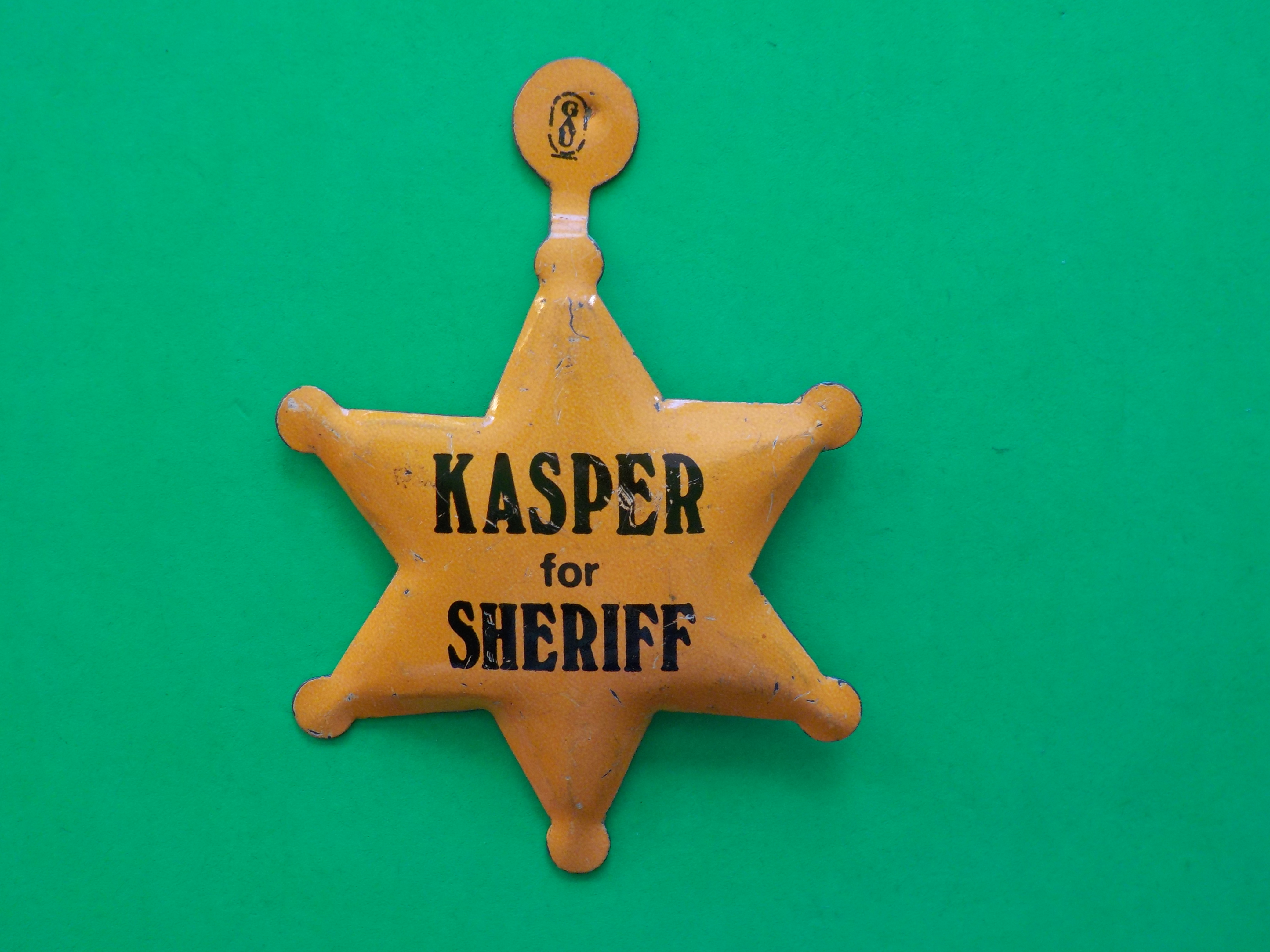
What? There’s a Chicago Republican Party? And one guy ran it for 31 years? A son of Polish immigrants, Lou Kasper was a WWII vet and long-time 30th Ward GOP Committeeman. Kasper spent a half-century serving the public at the Tollway, Secretary of State, CMS, Cook County Sheriff/State’s Attorney. His list of bosses is a Who’s Who of that era of GOP politics: Ben Adamowski, Joe Woods, Bernie Carey, Big Jim Thompson, Ty Fahner, Jim Edgar.
Born in Humboldt Park and fluent in Polish, Richard Brzeczak was Chicago’s youngest top cop ever (37). After taking on Daley the Younger for State’s Attorney, Brzeczak was indicted for improper use of travel funds, which he called politically-motivated. He was acquitted, then authored a book about - uh - marital relations.
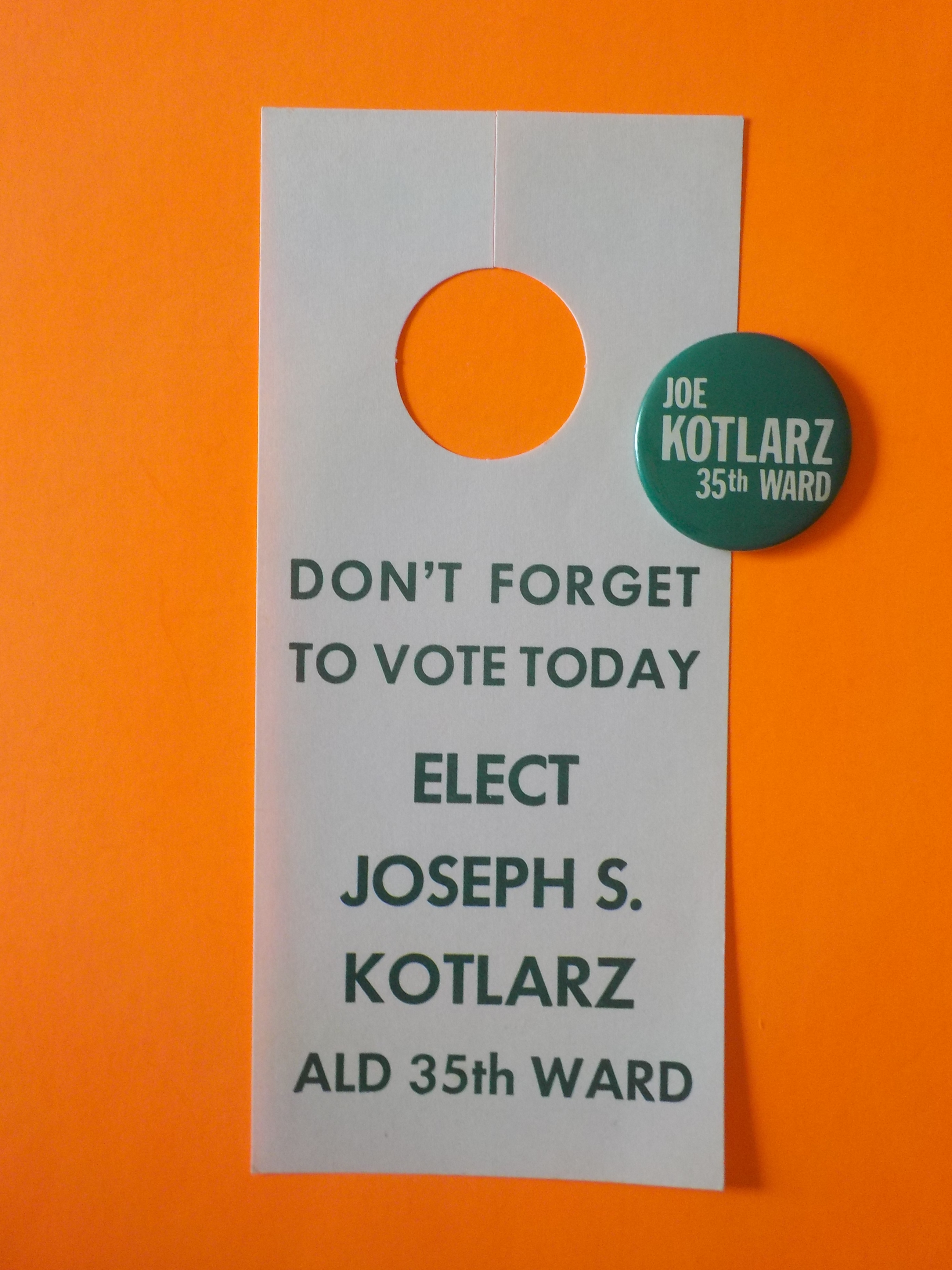
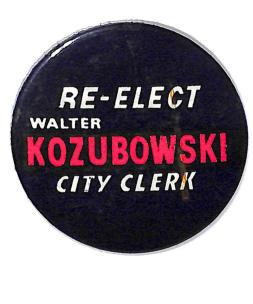
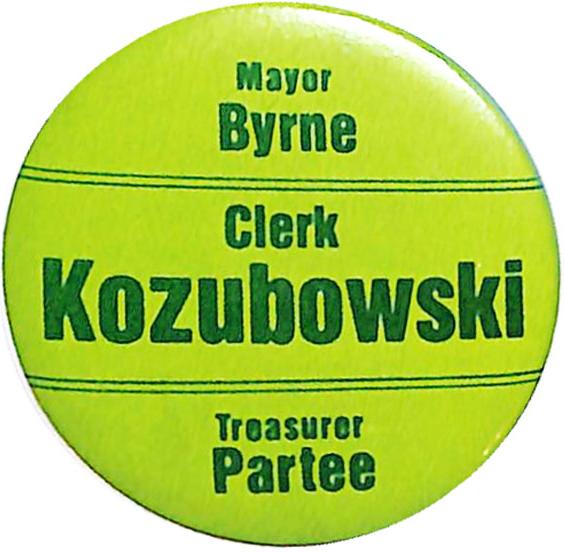

Caught with their hands in the kolaczki jar (since 1973)
- Chicago Ald. Casey Staszcuk (13th Ward). Convicted in 1973 - bribery related to zoning.
- Chicago Ald. Joe Potempa (23rd). Convicted in 1973 - extortion, tax evasion.
- Chicago Ald. Frank Kuta (23rd). Convicted in 1974 - extortion, tax evasion.
- Chicago Ald. (12th) and State Rep. Don Swinarski. Convicted in 1975 - tax fraud. (His father Sen. Ted Swinarski was tossed out of the State Senate in 1964 for residency violations, making them the only father-and-son team to be removed from the Illinois Legislature.)
- Cook County Comm. Charlie Bonk. Convicted in 1975 - extortion relating to zoning, tax fraud.
- Chicago Ald. Stanley Zydlo (26th). Convicted in 1980 - Fire Department test-fixing.
- Chicago Ald. Chester Kuta (31rd). Convicted in 1987 - tax evasion, civil rights violations. 31st Ward Comm. and State Sen. Eddie Nedza also convicted that year - shaking down a flea market.
- State Rep. and City Clerk Walter Kozubowski. Convicted in 1993 - mail fraud, tax evasion, ghost-payrolling.
- Cong. Dan Rostenkowski. Pleaded guilty in 1996 - charges related to the “Great House Post Office Scandal”, fraud, ghost-payrolling.
- Chicago Ald. John Madrzyk (13th). Convicted in 1998 - ghost-payrolling, extortion, bribery.
- Chicago Ald. (35th) and State Rep. Joe Kotlarz. Convicted in 1997 - theft related to his lobbying work for the Tollway.
- Chicago Ald. (23rd) and City Clerk Jim Laski. Convicted in 2006 - bribery, fraud.
Chicago Ald. Edwin Fifielski (45th), a national fallout shelter advocate, beat a Daley-backed foe in 1963. A critic of scattered site housing, he stood trial with Ald. Tom Keane in ‘73 for bank kickbacks. Keane went to prison, but Fifielski won another term. He was ousted in ‘79.
(Thanks for some of these tasty kolaczkis to Tom Gradel & Dick Simpson, authors of “Corrupt Illinois: Patronage, Cronyism and Criminality”)
One Family’s Journey
This author is 3/8 Polish: one great-grandparent was born in Poland (Ignasz Przyblski of Warsaw) and two (Frank Walkowiak, Helen Ostrowski) were born in Chicago to recently-arrived immigrants. Great-grandma Helen outlived my 7 other great-grandparents. I recall her apartment in Summit: ah, sweet smells of poppy-seed cake, lavender, the Argo Corn Starch plant. Always clutching a rosary supposedly blessed by the Pope. Probably used it plenty since my great-grandfather Iggy’s 63rd Street barber shop doubled as a bookie parlor.
But my great-great-grandfather - Joe Walkowiak - now, HE was a Polish-American pol. Born in 1865 in Krakow, the “Duke” came to Chicago’s Southeast Side, worked the steel mills, and became unofficial “Mayor” of neighborhood Poles (complete with “ring-kissing”).
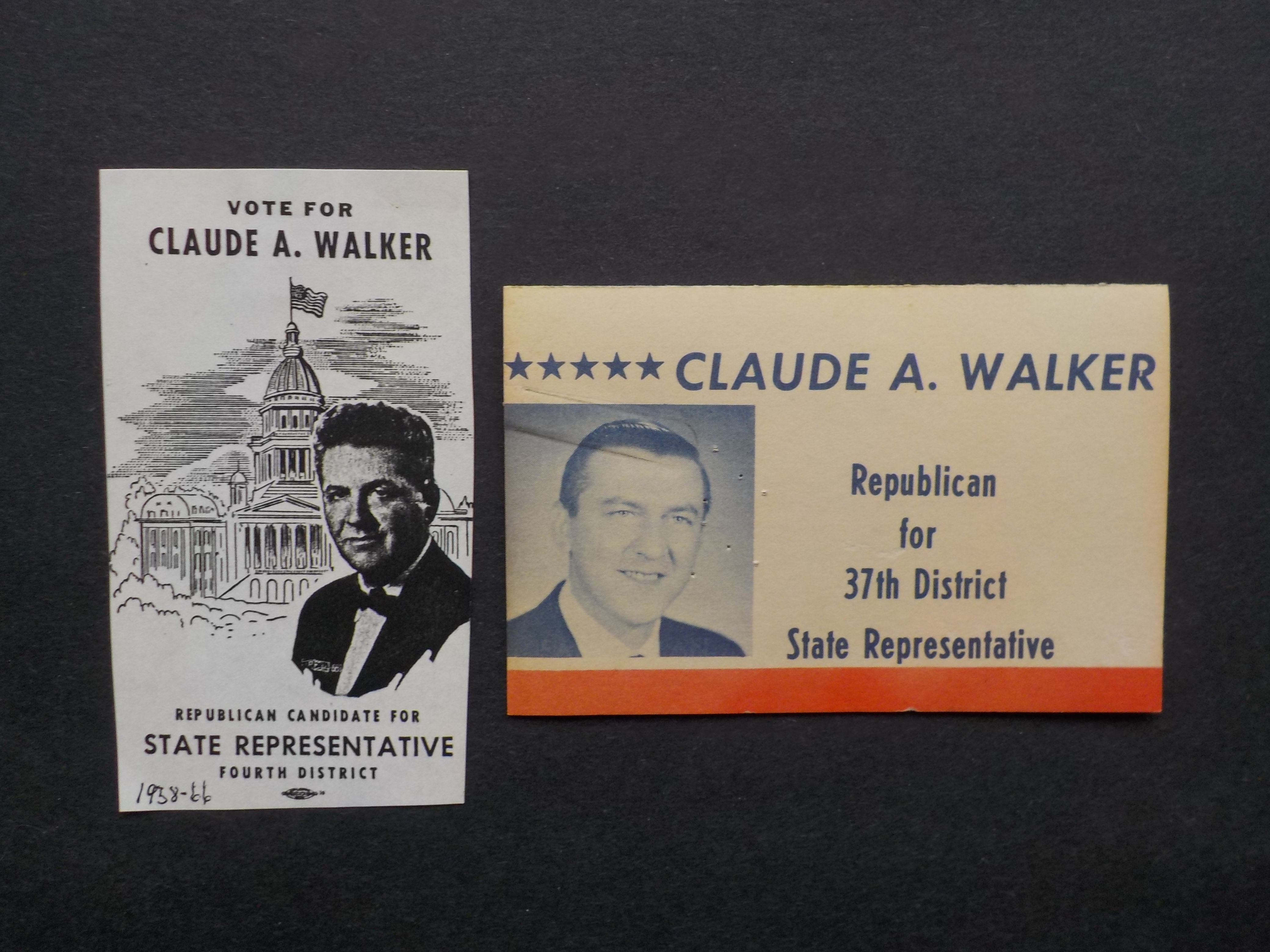
His grandson was my grandfather. Claude Walker, Sr., changed the name from “Walkowiak” (“Walker” was a “better ballot name”.) He served in the Illinois House, losing in the infamous 1962 statewide “bedsheet ballot”. A newspaperman, attorney and former semi-pro linebacker, “Pop” once punched out a lobbyist in a Springfield elevator who called him a “dumb Polack”. “Not so dumb,” Pop supposedly said to the guy on the floor.
My dad, Claude Walker, Jr., served on the DuPage County Board. All 3 Claude Walkers ran for the House, shared a love of baseball & poppy-seed cake, and had a chin straight outta Krakow.
- Claude Walker. Bicentennial-by-Buttons: 200 Years of Trailblazers, Rascals and Felons
Good reading:
“Polish-American Politics in Chicago, 1888-1940” by Edward Kantowicz
“Chicago’s Polish Downtown” by Victoria Granacki
“Avondale and Chicago’s Polish Village” by Jacob Kaplan, Daniel Pogorzelski, Rob Reid and Elisa Addlesperger
“The Encyclopedia of Chicago” entry on “Poles”, by Dominic Pacyga
“Will Polish Politicians Ever Gain Power in Chicago? By Russ Stewart, 6-26-13
“Clout” by Len O’Connor
“Chicago Politics Ward by Ward” by David Fremon
“Corrupt Illinois: Patronage, Cronyism and Criminality” by Tom Gradel & Dick Simpson
Also check out the Busy Beaver Museum archives and Ron Wade's website.